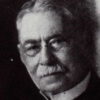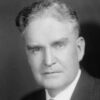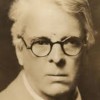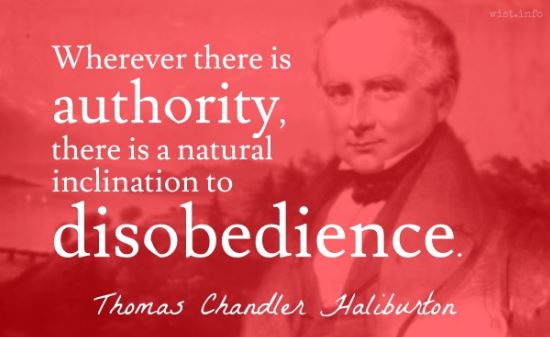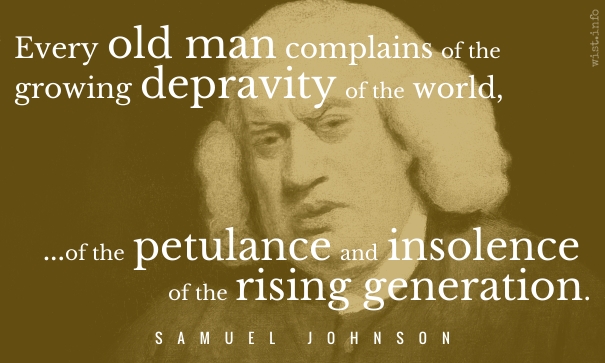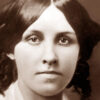Yung phools are comparatiff harmless, it iz the old phools that make most ov the trubble in this world.
[Young fools are comparatively harmless; it is the old fools that make most of the trouble in this world.]
Josh Billings (1818-1885) American humorist, aphorist [pseud. of Henry Wheeler Shaw]
Josh Billings’ Trump Kards, ch. 6 “Pets” (1874)
(Source)
Quotations about:
youth
Note not all quotations have been tagged, so Search may find additional quotes on this topic.
By the bye, as I must leave off being young, I find many douceurs [sweets] in being a sort of chaperon, for I am put on the sofa near the fire and can drink as much wine as I like.
Jane Austen (1775-1817) English author
Letter (1813-11-06) to Cassandra Austen
(Source)
Jane was 38 at the time.
Parents often talk about the younger generation as if they didn’t have anything to do with it.
I like to sit and have a talk sometimes with that odd little chap that was myself long ago. I think he likes it too, for he comes so often of an evening when I am alone with my pipe, listening to the whispering of the flames. I see his solemn little face looking at me through the scented smoke as it floats upward, and I smile at him; and he smiles back at me, but his is such a grave, old-fashioned smile. We chat about old times; and now and then he takes me by the hand, and then we slip through the black bars of the grate and down the dusky glowing caves to the land that lies behind the firelight. There we find the days that used to be, and we wander along them together. He tells me as we walk all he thinks and feels. I laugh at him now and then, but the next moment I wish I had not, for he looks so grave I am ashamed of being frivolous. Besides, it is not showing proper respect to one so much older than myself — to one who was myself so very long before I became myself.
Jerome K. Jerome (1859-1927) English writer, humorist [Jerome Klapka Jerome]
Idle Thoughts of an Idle Fellow, “On Memory” (1886)
(Source)
First published in Home Chimes (1885-09-26).
It is well we cannot see into the future. There are few boys of fourteen who would not feel ashamed of themselves at forty.
Jerome K. Jerome (1859-1927) English writer, humorist [Jerome Klapka Jerome]
Idle Thoughts of an Idle Fellow, “On Memory” (1886)
(Source)
First published in Home Chimes (1885-09-26).
The uses of a dictionary: at thirteen we look up lewd, licentious, lascivious; at thirty, febrile and inchoate; at fifty, endostosis.
Mignon McLaughlin (1913-1983) American journalist and author
The Neurotic’s Notebook, ch. 10 (1963)
(Source)
Don’t spurn sweet love,
my child, and don’t you be neglectful
of the choir of love, or the dancing feet,
while life is still green, and your white-haired old age
is far away with all its moroseness. Now,
find the Campus again, and the squares,
soft whispers at night, at the hour agreed,
and the pleasing laugh that betrays her, the girl
who’s hiding away in the darkest corner,
and the pledge that’s retrieved from her arm,
or from a lightly resisting finger.
[Nec dulcis amores
sperne puer neque tu choreas,
donec virenti canities abest
morosa. Nunc et campus et areae
lenesque sub noctem susurri
conposita repetantur hora,
nunc et latentis proditor intumo
gratus puellae risus ab angulo
pignusque dereptum lacertis
aut digito male pertinaci.]Horace (65-8 BC) Roman poet and satirist [Quintus Horacius Flaccus]
Odes [Carmina], Book 1, # 9, l. 15ff (1.9.15-24) (23 BC) [tr. Kline (2015)]
(Source)
"To Thaliarchus." (Source (Latin)). Alternate translations:Till testy Age gray Hairs shall snow
Upon thy Head, lose Mask, nor Show:
Soft whispers now delight
At a set hour by Night:
And Maids that gigle to discover
Where they are hidden to a Lover;
And Bracelets or some toy
Snatcht from the willing Coy.
[tr. Fanshaw (Brome (1666))]Secure those golden early joys,
That youth unsoured with sorrow bears,
Ere withering time the taste destroys,
With sickness and unwieldy years.
For active sports, for pleasing rest,
This is the time to be possest;
The best is but in season best.
The appointed hour of promised bliss,
The pleasing whisper in the dark,
The half unwilling willing kiss,
The laugh that guides thee to the mark;
When the kind nymph would coyness feign,
And hides but to be found again;
These, these are joys the gods for youth ordain.
[tr. Dryden (c. 1685)]Whilst Thou art green, and gay, and Young,
E're dull Age comes, and strength decays,
Let mirth, and humor, dance, and song
Be all the trouble of thy days.
The Court, the Mall, the Park, and Stage,
With eager thoughts of Love pursue;
Gay Evening whispers fit thy Age,
And be to Assignation true.
Now Love to hear the hiding Maid,
Whom Youth hath fir'd, and Beauty charms
By her own tittering laugh betray'd,
And forc'd into her Lover's Arms.
Go dally with thy wanton Miss,
And from the Willing seeming Coy,
Or force a Ring, or steal a Kiss;
For Age will come, and then farewell to joy.
[tr. Creech (1684)]Sport in life's young spring,
Nor scorn sweet love, nor merry dance,
While years are green, while sullen eld
Is distant. Now the walk, the game,
The whisper'd talk at sunset held,
Each in its hour, prefer their claim.
Sweet too the laugh, whose feign'd alarm
The hiding-place of beauty tells,
The token, ravish'd from the arm
Or finger, that but ill rebels.
[tr. Conington (1872)]Nor disdain, being a young fellow, pleasant loves, nor dances, as long as ill-natured hoariness keeps off from your blooming age. Now let both the Campus Martius and the public walks, and soft whispers at the approach of evening be repeated at the appointed hour: now, too, the delightful laugh, the betrayer of the lurking damsel from some secret corner, and the token ravished from her arms or fingers, pretendingly tenacious of it.
[tr. Smart/Buckley (1853)]Let beauty's glance
Engage thee, and the merry dance,
Nor deem such pleasures vain!
Gloom is for age. Young hearts should glow
With fancies bright and free,
Should court the crowded walk, the show,
And at dim eve love's murmurs low
Beneath the trysting tree;
The laugh from the sly corner, where
Our girl is hiding fast,
The struggle for the lock of hair,
The half well pleased, half angry air,
The yielded kiss at last.
[tr. Martin (1864)]Spurn not, thou, who art young, dulcet loves;
Spurn not, thou, choral dances and song
While the hoar-frost morose keeps aloof from thy verdure.
Thine the sports of the Campus, the gay public gardens;
Thine at twilight the words whispered low;
Each in turn has its own happy hour:
And thine the sweet laugh of the girl -- which betrays her
Hiding slyly within the dim nook of the threshold,
And the love-token snatched from the wrist,
Or the finger's not obstinate hold.
[tr. Bulwer-Lytton (1870)]Youth must not spurn
Sweet loves, nor yet the dance forsake,
While grudging Age thy prime shall spare.
The Plain, the Squares, be now thy care,
And lounges, dear at nightfall, where
By concert love may whisper 'Hist!'
From inner nook a winsome smile
Betrays the girl that sculks the while,
And keepsakes, deftly filched by guile
From yielding finger, or from wrist.
[tr. Gladstone (1894)]Nor, while thy vigour lasts, despise thou
Pleasures of love, nor the joys of dancing.
While the moroseness due to advancing age
Whitens not yet thy head, let the walks and park
And gentle whispers heard at nightfall
Each be repeated at fitting seasons.
Now, too, the pleasant laughter be heard, that tells
How lurking beauty hides in the corner-nook,
And token ravish'd from the arm, or
Finger, that daintily seems unwilling.
[tr. Phelps (1897)]Being but yet a youth, contemn
Neither the sweets of love nor of the dance,
While from your bloom crabbed greyness holds aloof.
Now let the Campus and the city squares,
And whispers low, be sought at nightfall,
On the appointed hour of tryst;
And now the fascinating laugh from some recess
Secluded, the betrayer of a maid
In hiding, and the pledge snatched off
An arm or finger ill retaining it.
[tr. Garnsey (1907)]Spurn not the dance,
Or in sweet loves to bask,
While surly age mars not thy morning's flower.
Seek now the athlete's training field or court;
See gentle lovers' whispered sport,
At nightfalls's trysted hour;
Seek the gay laught that from her ambush borne
Betrays the merry maiden huddled warm,
And forfeit from her hand or arm
Half given, half playful torn.
[tr. Marshall (1908)]Nor in thy youth neglect sweet love nor dances, whilst life is still in its bloom and crabbed age is far away! Now let the Campus be sought and the squares, with low whispers at the trysting-hour as night draws on, and the merry tell-tale laugh of maiden hiding in farthest comer, and the forfeit snatched from her arm or finger that but feigns resistance.
[tr. Bennett (Loeb) (1912)]Scorn not, while still
A boy, sweet loves; scorn not the dance.
Life in its Spring, and crabbed eld
Far off -- that is the time; then hey
For Park, Square, whispered concerts held
At a set hour at close of day:
For the sweet laugh whose soft alarm
Tells in what nook the maid lies hid:
For the love-token snatched from arm,
Of fingers that but half-forbid.
[tr. Mills (1924)]Now that you're young, and peevish
Grey hairs are still far distant, attend to the
Dance-floor, the heart's sweet business; for now is the
Right time for midnight assignations,
whispers and murmurs in Rome's piazzas
And fields, and soft, low laughter that gives away
The girl who plays love's games in a hiding-place --
Off comes a ring coaxed down an arm or
Pulled from a faintly resisting finger.
[tr. Michie (1963)]Take love while you're young and you can,
Laugh, dance,
Before time takes your chances
Away. Stroll where baths, where theaters
Bring Romans to walk, to talk, where whispers
Flit through the darkness as lovers meet,
And girls laugh from hidden corners,
Happy as favors
Are snatched in the darkness, laugh
And pretend to say no.
[tr. Raffel (1983)]While you're still young,
And while morose old age is far away,
There's love, there are parties, there's dancing and there's music,
There are young people out in the city squares together
As evening comes on, there are whispers of lovers, there's laughter.
[tr. Ferry (1997)]Do not disdain, boy, sweet love; and dance
while you are yet in bloom, and crabbed age far away.
Now frequent the Campus Martius
and public ways, and pizzas where soft whispers
are repeated at the trysting hour
and where the suffocated laughter of a girl
lurking in a corner reveals
secret betrayal and the forfeit
snatched away from a wrist
or from a finger, scarcely resisting.
[tr. Alexander (1999)]And while you're young don't scorn
sweet love affairs and dances,
so long as crabbed old age is far from
your vigor. Now let the playing field and the
public squares and soft whisperings at nightfall
(the appointed hour) be your pursuits;
now too the sweet laughter of a girl hiding
in a secret corner, which gives her away,
and a pledge snatched from her wrists
or her feebly resisting finger.
[tr. Wikisource (2021)]
Someday we will regard our children not as creatures to manipulate or to change but rather as messengers from a world we once deeply knew, but which we have long since forgotten, who can reveal to us more about the true secrets of life, and also our own lives, than our parents were ever able to.
Alice Miller (1923-2010) Polish-Swiss psychologist, psychoanalyst, philosopher
For Your Own Good [Am Anfang war Erziehung], “Preface to the American Edition” (1980) [tr. Hannum/Hannum (1983)]
(Source)
SYPHAX: Young men soon give and soon forget affronts;
Old age is slow in both.Joseph Addison (1672-1719) English essayist, poet, statesman
Cato, Act 2, sc. 5, l. 136ff (1713)
(Source)
Youth is not a time of life; it is a state of mind; it is not a matter of rosy cheeks, red lips and supple knees; it is a matter of the will, a quality of the imagination, a vigor of the emotions; it is the freshness of the deep springs of life.
Youth means a temperamental predominance of courage over timidity of the appetite, for adventure over the love of ease. This often exists in a man of sixty more than a boy of twenty. Nobody grows old merely by a number of years. We grow old by deserting our ideals.
Years may wrinkle the skin, but to give up enthusiasm wrinkles the soul. Worry, fear, self-distrust bows the heart and turns the spirit back to dust.
Whether sixty or sixteen, there is in every human being’s heart the lure of wonder, the unfailing child-like appetite of what’s next, and the joy of the game of living.
When the aerials are down, and your spirit is covered with snows of cynicism and the ice of pessimism, then you are grown old, even at twenty, but as long as your aerials are up, to catch the waves of optimism, there is hope you may die young at eighty.
Samuel Ullman (1840-1924) German-American businessman, poet, humanitarian, religious leader
“Youth” (1918)
(Source)
This poem was a favorite of Douglas MacArthur, who had a copy hung in his office in Tokyo, and was responsible for much of the author's subsequent fame in Japan.
When a twelfth-century youth fell in love he did not take three paces backward, gaze into her eyes, and tell her she was too beautiful to live. He said he would step outside and see about it. And if, when he got out, he met a man and broke his head — the other man’s head, I mean — then that proved that his — the first fellow’s — girl was a pretty girl. But if the other fellow broke his head — not his own, you know, but the other fellow’s — the other fellow to the second fellow, that is, because of course the other fellow would only be the other fellow to him, not the first fellow who — well, if he broke his head, then his girl — not the other fellow’s, but the fellow who was the — Look here, if A broke B’s head, then A’s girl was a pretty girl; but if B broke A’s head, then A’s girl wasn’t a pretty girl, but B’s girl was. That was their method of conducting art criticism.
Jerome K. Jerome (1859-1927) English writer, humorist [Jerome Klapka Jerome]
Idle Thoughts of an Idle Fellow, “On Being Idle” (1886)
(Source)
Nothing — so it seems to me — is more beautiful than the love that has weathered the storms of life. The sweet, tender blossom that flowers in the heart of the young — in hearts such as yours — that, too, is beautiful. The love of the young for the young, that is the beginning of life. But the love of the old for the old, that is the beginning of — of things longer.
Jerome K. Jerome (1859-1927) English writer, humorist [Jerome Klapka Jerome]
“Passing of the Third Floor Back” [The Stranger] (1908)
(Source)
Still you say, the young man has the hope of long life — a hope which the old cannot have. That hope is sheer wishful thinking, for what is more irrational than to count the uncertain as certain, the false as true? But the old man has nothing to look forward to at all. Even so, he is in better sort than the young, for he has obtained what the young only hope for: the young want to live a long life; the old have lived it.
[At sperat adulescens diu se victurum, quod sperare idem senex non potest. Insipienter sperat; quid enim stultius quam incerta pro certis habere, falsa pro veris? At senex ne quod speret quidem habet. At est eo meliore condicione quam adulescens, quoniam id quod ille sperat hic consecutus est: ille volt diu vivere, hic diu vixit.]
Marcus Tullius Cicero (106-43 BC) Roman orator, statesman, philosopher
De Senectute [Cato Maior; On Old Age], ch. 19 / sec. 68 (19.68) (44 BC) [tr. Copley (1967)]
(Source)
(Source (Latin)). Alternate translations:But ye may saye that the man adolescent & yong hopith that he shall lyve longe & aftir that a man is olde he may not have such an hope. Therfor I answere you that the yong man hopith foliously if by cause of his yong age he wenith to live long, for he is not certayn therof nor knowith not the trouthe. Now ther is nothyng more foly thene is for to have & holde the doubtuose thyngys as certayn & the fals as true & if ye oppose agenst olde age that the olde man hath nothyng in hym whereby he may hope to lyve more, I answere you, Scipion & Lelius, that by this thyng is bettir the condicion & the astate of the olde man than of the yong man, for the yong man will lyve long & the olde man hath lyved long.
[tr. Worcester/Worcester/Scrope (1481)]But a young man hopeth to live long, which an old man may not look to do. He truly feedeth himself with a vain and a foolish, hope. For what merer folly can there be, than to accompt and repute things which be doubtful and uncertain, for infallible and certain, and things that are false, for true? An old man hath nothing to hope for; but he is therefore in far better state and case than is a young man, for he hath already enjoyed and obtained that, which the young man doth but hope for. The one desireth to live long, the other hath already lived long.
[tr. Newton (1569)]But the young man hopes to live long, which the old man cannot. He hopes foolishly; for what is greater folly, then to account uncertain things for certain, false for true? The old man hath nothing to hope for more; therefore he is in better state then the former, seeing that what the other wisheth for, he hath obtained already; the young man would live long, the old man hath lived long.
[tr. Austin (1648), ch. 21]But vigorous Youth may his gay thoughts erect
To many years, which Age must not expect,
But when he sees his airy hopes deceiv'd,
With grief he saies, who this would have believ'd?
We happier are then they, who but desir'd
To possess that, which we long since acquir'd.
[tr. Denham (1669)]But Youth, you'll say perhaps, may live in Hopes of Length of Days, when we are deprived even of all Hope. A childish Hope this indeed! To hold Uncertainties for Certainties, and Falsity for Truth! Old Age, you say, has not even Hope for its Relief; but, even in that Respect, is it not far preferable to Youth, in being actually possessed of what the other only hopes for? Long Life is sure on the one side, and only wished for on the other.
[tr. Hemming (1716)]But the young Man is in Hopes of Living long, which the Old cannot. I must tell him he hopes foolishly; for, can there be a greater Instance of Folly than to make sure of Uncertainties; or embrace Falsities for Truth? The Old Man has nothing more to hope for; then he is in a better State than the Young one, since what this hopes for, the other has already attain'd: The one is in Hopes of Living long, the other has done it.
[tr. J. D. (1744)]It may however be said, perhaps, that Youth has Room at least to hope they have Length of Life before them, which in Old Men would be vain. But foolish is that Hope: For what can be more absurd, than to build on utter Uncertainties, and account on that for sure, which probably may never happen? And to what is alleged, that the Old Man has no Room lest for Hope, I say, Just so much the happier is his Condition, than that of the Young; because he has already attained, and is sure of what the other only wishes and hopes for: The one wishes to live long, the other is at the End of that Wish, he has got it; for he has lived long already.
[tr. Logan (1744)]It will be replied, perhaps, that "youth may at least entertain the hope of enjoying many additional years; whereas an old man cannot rationally encourage so pleasing an expectation." But is it not a mark of extreme weakness to rely upon precarious contingencies, and to consider an event as absolutely to take place, which is altogether doubtful and uncertain? But admitting that the young may indulge this expectation with the highest reason, still the advantage evidently lies on the side of the old; as the latter is already in possession of that length of life which the former can only hope to attain.
[tr. Melmoth (1773)]But a young man hopes that he shall live long; which same thing an old man cannot hope. He hopes absurdly. For what is sillier than to hold uncertainties for certainties, the false for true? An old man has not even what he may hope; but he is by that in a better condition than the young man, since that which the former hopes for, the latter has attained. The former wishes to live long; the latter has lived long.
[Cornish Bros. ed. (1847)]Yet a young man hopes that he will live a long time, which expectation an old man cannot entertain. His hope is but a foolish one: for what can be more foolish than to regard uncertainties as certainties, delusions as truths? An old man indeed has nothing to hope for; yet he is in so much the happier state than a young one; since he has already attained what the other is only hoping for. The one is wishing to live long, the other has lived long.
[tr. Edmonds (1874)]But, it is said, the young man hopes to live long, while the old man can have no such hope. The hope, at any rate, is unwise; for what is more foolish than to take things uncertain for certain, false for true? Is it urged that the old man has absolutely nothing to hope? For that very reason he is in a better condition than the young man, because what the youth hopes he has already obtained. The one wishes to live long; the other has lived long.
[tr. Peabody (1884)]Yes, you will say; but a young man expects to live long; an old man cannot expect to do so. Well, he is a fool to expect it. For what can be more foolish than to regard the uncertain as certain, the false as true? "An old man has nothing even to hope." Ah, but it is just there that he is in a better position than a young man, since what the latter only hopes he has obtained. The one wishes to live long; the other has lived long.
[tr. Shuckburgh (1895)]But you will say the young
Have hope of life, which is to us denied.
A foolish hope. For what more foolish is
Than where no surety is to think things sure,
Where all is doubtful to believe them fixed?
Granted the old man cannot even hope:
'Tis all the better since he has attained
To what the young man only hopes to gain:
The one desires long life, the other's lived.
[tr. Allison (1916)]But, you may say, the young man hopes that he will live for a long time and this hope the old man cannot have. Such a hope is not wise, for what is more unwise than to mistake uncertainty for certainty, falsehood for truth? They say, also, that the old man has nothing even to hope for. Yet he is in better case than the young man, since what the latter merely hopes for, the former has already attained; the one wishes to live long, the other has lived long.
[tr. Falconer (1923)]There is a crucial difference between a young man and an old one: the one hopes for a long life yet to come, and the other knows that his time is nearly up. But a hope is only a hope: what is more foolish than to confuse what is uncertain with what is certain, and what is false with what is true? The young man who lives in a state of great expectations is much worse off than the old man who looks forward to nothing. One can only dream of what the other has accomplished: one wants to live a long time, but the other already has.
[tr. Cobbold (2012)]But, you say, that is not the point. The point is that a young person can reasonably hope to live a long time and an old one cannot. What an unwise hope. I mean, what is more follish than to value uncertainty above certainty? Look at life this way, what the young person only hopes for (and the hope is uncertain, as we have seen), the old person already has. The one hopes to live a long time, the other has already done so.
[tr. Gerberding (2014)]But they say a young man hopes in a long lease
Of life while an old man awaits its surcease.
Taking certain for uncertain is a wish,
Like taking false for true, completely foolish.
But, they add, even at the end of the rope
An old man is in a better shape than a young man
For he has already fulfilled his life’s hope.
One wants the long life the other had in full measure,
ut dear gods what is “long” in man’s nature?
[tr. Bozzi (2015)]But you may argue that young people can hope to live a long time, whereas old people cannot. Such hope is not wise, for what is more foolish than to mistake something certain for what is uncertain, or something false for what is true? You might also say8 that an old man has nothing at all to hope for. But he in fact possesses something better than a young person. For what youth longs for, old age has attained. A young person hopes to have a long life, but an old man has already had one.
[tr. Freeman (2016)]But the young person hopes to live for a long time, a very hope which the old person cannot hold. They hope unwisely for what is more foolish than to take uncertainty for certainty and falsehood for truth. They claim also that the old person has nothing to hope for. But the elderly are in a better place than the young because the young merely hope for what the elderly have obtained and the one wishes to live long, while the other has already done so.
[tr. @sentantiq (2021)]
Let others, then, have their weapons, their horses and their spears, their fencing-foils, and games of ball, their swimming contests and foot-races, and out of many sports leave us old fellows our dice and knuckle-bones. Or take away the dice-box, too, if you will, since old age can be happy without it.
[Sibi habeant igitur arma, sibi equos, sibi hastas, sibi clavam et pilam, sibi natationes atque cursus; nobis senibus ex lusionibus multis talos relinquant et tesseras; id ipsum ut lubebit, quoniam sine eis beata esse senectus potest.]
Marcus Tullius Cicero (106-43 BC) Roman orator, statesman, philosopher
De Senectute [Cato Maior; On Old Age], ch. 16 / sec. 58 (16.58) (44 BC) [tr. Falconer (1923)]
(Source)
The actual gaming objects for old folk that Cicero refers to were the talus (a long four-sided die) and the tessera (a six-sided die). Various games were played rolling these, on their own or together.
(Source (Latin)). Alternate translations:Yong men have for them for theyr solas & worship, their armours, their horsys, their speris, pollaxis mallys, and Instrumentys of iren, or of leed, and launcegayes for to fyght. And also maryners in vsyng the see and yong men deliten in shippys bargys of dyvers fassions and in rowynges and in sayllyng in watirs and ryvers and in the sees, and som yong men usen the cours of voyages in gooyng rydyng and iourneyeng from one counttre to anothir, and emong many othir labours of playes sportys and of dyvers solacys. The yong men also levyn to the use of olde men the playe at the tablis and chesse and the philosophers playe by nombre of arsmetrike as is made mencion in the boke of O∣vide de vetula callid the reformacion of his life. But we demaunde the Caton, if the olde men may goodly use and when we be olde of thies two said playes of the tablis and chesse, I answere you nay, for withoute thies two playes ol̄de age may wele be stuffid and fulfillyd of alle othir goodnes perteynyng to felicite and to blessidnesse. Now it is so that olde age and yche othir age usyng of discression ought not to doo any thyng, but that it drawe and be longe to vertues and to blessidnesse in stede of playes at tables and at chesses.
[tr. Worcester/Worcester/Scrope (1481)]Let us therefore bid adieu to all such youthly pranks and exercises as lusty and green-headed gallants, agitated and pricked with the fervent heat of unadvised adolescence, do enure themselves withal: God speed them well with their usual disports and dalliance; let them take to themselves their armour, weapons, and artillery; let us permit and give them good leave to daunt fierce horses and with spears in rest to mount on courageous coursers; let them handle the pike, toss the javelin and club daily, and play at the tennis, exercise themselves with running, swimming, and such-like deeds of activity and nimbleness. To us old men among all their other games and pastimes, let them leave the tables, the chance-bone or dice, and the chess, which without any danger or sore straining of the body may be practiced. And yet I will not seem to allow these last-named games further than every man himself is disposed, because they be not necessary, and old age may without them be blessed and fortunate.
[tr. Newton (1569)]Therefore young men have their weapons, their horses, their speares, their swimming, the ball, the club, and their races, and they leave to us old men the cards and the tables which we sometimes use when we list; for age may be right happy without them.
[tr. Austin (1648)]Let those of younger Years take to themselves all the Diversions of their several sorts of Gaming, Fencing, Racing, or Bathing can afford them: leave us to our Chesse-boards, and our Tables; and yet we are not solicitous even for those, since the Happiness of old Age does not depend on them.
[tr. Hemming (1716)]Let therefore the young have their Arms, Horse, Spears, Lances, Balls, Baths, and Races; and of their many Diversions, leave to us the Cards and the Tables, to make use of just when we please; for Old Age can be happy without them.
[tr. J. D. (1744)]To others therefore we can freely resign all other Diversions, in Arms and Horses, with their military Exercises, and all their Accoutrements, their Tennis, and every other Sport; only, if they please, they may leave us Checquers and Tables; or even these also we can give up; since Old Age can be very easy and very happy without any such trifling Amusements.
[tr. Logan (1744)]In respect to the peculiar articles of rural diversions, let those of a more firm and vigorous age enjoy the robust sports which are suitable to that season of life; let them exert their manly strength and address in darting the javelin, or contending in the race; in wielding the bat, or throwing the ball; in riding, or in swimming; but let them, out of the abundance of their many other recreations, resign to us old fellows the sedentary games of chance. Yet if they think proper even in these to reserve to themselves an exckisive right, I shall not controvert their claim; they are amusements by no means essential to a philosophic old age.
[tr. Melmoth (1773)]Therefore let them keep to themselves their arms, horses, spears, cudgel, ball, swimming, and running; and let them leave to us old men, out of so many sports, our astragals and dice; and that very thing whether it shall be to our mind, since old age can be happy without these things.
[Cornish Bros. ed. (1847)]Let the young, therefore, keep to themselves their arms, horses, spears, clubs, tennis-ball, swimmings, and races: to us old men let them leave out of many amusements the tali and tessera; and even in that matter it may be as they please, since old age can be happy without these amusements.
[tr. Edmonds (1874)]Let others take for their own delight arms, horses, spears, clubs, balls, swimming-bouts, and foot-races. From their many diversions let them leave for us old men knuckle-bones and dice. Either will serve our turn; but without them old age can hardly be contented.
[tr. Peabody (1884)]Let the young keep their arms then to themselves, their horses, spears, their foils and ball, their swimming baths and running path. To us old men let them, out of the many forms of sport, leave dice and counters; but even that as they choose, since old age can be quite happy without them.
[tr. Shuckburgh (1895)]Let who will keep their arms, their steeds, their spears,
Their club and ball, and let them swim and run,
But let them leave from many forms of sport
The dice to us old men, or take them too
If so they will: old age can do without
These trifles, and enjoy full happiness.
[tr. Allison (1916)]No, let young people keep their equipment, their horses, their spears, their foils, their ball-games, their swimming and running, and out of all their amusements let them leave to us old fellows just the knuckle-bones and dice -- and then only if it strikes their fancy, for old age can be quite happy without them.
[tr. Copley (1967)]You won't find us [old men] in armor or on horseback throwing spears; we don't fence with sticks or play catch; we'll let other people compete with each other in running or swimming races. Maybe we'll gamble a little with dice or knucklebones, or maybe not -- but, in any case, we'll be perfectly content.
[tr. Cobbold (2012)]Therefore let others keep their fast cars, speed boats, fitness centers, bats, rackets, and balls, and leave us our checkers and bridge cards. But you know, they can take those too if we have a nice garden.
[tr. Gerberding (2014)]Let the young have arm and mount
Let them have ball and stick and pike
Let them swim and scurry too,
To the old are paramount
Only dice games and the like.
Should they deem those games undue
We’ll comply without ado.
[tr. Bozzi (2015)]Let others have their weapons, their horses, their spears and fencing foils, their balls, their swimming contests and food traces. Just leave old men like me our dice and knucklebones. Or take away those too if you want. Old age can be happy without them.
[tr. Freeman (2016)]Let others have weapons, horses, spears, fencing-foils, ball games, swimming competitions, races, and leave to the old men dice and knucklebones for games. Or let that go too since old age can be happy without it.
[tr. @sentantiq (2018)]
We come now to the third ground for abusing old age, and that is, that it is devoid of sensual pleasures. O glorious boon of age, if it does indeed free us from youth’s most vicious fault! Now listen, most noble young men, to what that remarkably great and distinguished man, Archytas of Tarentum, said in an ancient speech repeated to me when I was a young man serving with Quintus Maximus at Tarentum: “No more deadly curse,” said he, “has been given by nature to man than carnal pleasure, through eagerness for which the passions are driven recklessly and uncontrollably to its gratification. From it come treason and the overthrow of states; and from it spring secret and corrupt conferences with public foes. In short, there is no criminal purpose and no evil deed which the lust for pleasure will not drive men to undertake. Indeed, rape, adultery, and every like offence are set in motion by the enticements of pleasure and by nothing else; and since nature — or some god, perhaps — has given to man nothing more excellent than his intellect, therefore this divine gift has no deadlier foe than pleasure; for where lust holds despotic sway self-control has no place, and in pleasure’s realm there is not a single spot where virtue can put her foot.”
[Sequitur tertia vituperatio senectutis, quod eam carere dicunt voluptatibus. O praeclarum munus aetatis, si quidem id aufert a nobis, quod est in adulescentia vitiosissimum! Accipite enim, optimi adulescentes, veterem orationem Archytae Tarentini, magni in primis et praeclari viri, quae mihi tradita est cum essem adulescens Tarenti cum Q. Maximo. Nullam capitaliorem pestem quam voluptatem corporis hominibus dicebat a natura datam, cuius voluptatis avidae libidines temere et effrenate ad potiendum incitarentur. Hinc patriae proditiones, hinc rerum publicarum eversiones, hinc cum hostibus clandestina colloquia nasci; nullum denique scelus, nullum malum facinus esse, ad quod suscipiendum non libido voluptatis impelleret; stupra vero et adulteria et omne tale flagitium nullis excitari aliis illecebris nisi voluptatis; cumque homini sive natura sive quis deus nihil mente praestabilius dedisset, huic divino muneri ac dono nihil tam esse inimicum quam voluptatem. Nec enim lubidine dominante temperantiae locum esse, neque omnino in voluptatis regno virtutem posse consistere.]
Marcus Tullius Cicero (106-43 BC) Roman orator, statesman, philosopher
De Senectute [Cato Maior; On Old Age], ch. 12 / sec. 39ff (12.39-41) (44 BC) [tr. Falconer (1923)]
(Source)
(Source (Latin)). Alternate translations:Nowe folowith the iij vituperacion & defaute by the which yong men seyne that olde age is noiouse myschaunte & wretchid by cause it hath almost no flesshely delectacyons or sensualitees as for to gete with childeren and yssue to encrece and multiplie the world. To whom I answere forwith that it is right a noble gyfte rewarde & the right grete worship of olde age that it be sequestred depryved and dischargid of the delectacyons of sensualitee of the body or flesshely lustis for ys it be so that olde age be pryved and sequestred of such delectacyons It had takin awey from us olde men that thyng whiche is right vicious & right foule in the age of adolescence & yongthe.
And neverthelesshe my right good and lovyng yong men Scipion and Lelius an auncyent senatour purposid an oracion that a philosopher callid Archites made whiche was takyn of Haniballe duc of Cartage when he werrid in Ytaile. He was recoverde by Quintus Fabius the noble senatour when he recoverd Tarente, takyn by the said Haniballe. Archites was pryncypally a grete man connyngly lernyd in sciences and in vertues and was right famous and noble. This oracion purposid which Archites made was yeven to me when I adolescent and yong of age was at Tarente with the seid Fabius, and by this oracyon seid Archites that nature which ordeyned to men complexions gave nevir no pestelence peyne nor turment more damageable to yong men than is flesshely delectacyon. The coveitous playsirs of delectacyon moven tyce and steeren men over boldely and withoute bridell of reason or shame or any restraynt to execute and make an ende of their foule lustys. For thought delectacy∣ons ben made and conspired treasons divisions and dissencyons of countrees & the destruccions of their comon profite, and the secretes of parlementys disclosed to our ennemyes and adversarye partye there is noon untrou∣the there is noon evyll werke but pleasyre of delectacyon which shall constrayne men to encline therto, by cause that they enioyen owt of mesure of spousehode brekyng & that so fervently the cause of defoulyng of maydens virgins the anontry of weddyd women & all such corrupte untrew werkys, whiche ben nevir mevid nor undirtakyn but by the insolence & wantownes & wenlacys of flesshely delectacyon. Archites also saide that as nature by power of which god hath yeven to men noth̄yng bettir than is the soule by the which they have undirstondyng & mynde, also to that soule which is an office & a gift dyvine nothyng is so grete ennemye nor so contrary as ben flesshely delectacyons, for sith delectacyon & flesshely pleasir have dominacyon in the regyon of man. That is to witt in the courage of his body, the vertue of attemperance may not be lodgid therin & wthin the regyon of man which is yeven to delectacyon may not abyde any wisedome nor vertue.
[tr. Worcester/Worcester/Scrope (1481)]Now followeth the third dispraise and fault which is laid in old age, because (say they) it is without pleasure, and must forego voluptuous appetites. O noble and excellent gift, wherewith old age is so blessed, if it take from us that thing, which is in youth most vicious and detestable. But you (noble and virtuous gentlemen, Scipio and Laelius) hear what Archytas, the famous philosopher of Tarentum, was wont to say, whose oration touching on the same matter was lent and delivered to me, when I was a young man and served under Quintus Maximus at the siege of Tarentum. He said that no plague was given by nature so great and pernicious unto men, as the bestial pleasures and voluptuousness of the body: which which pleasures the dissolute and libidinous lusts of men do so much affect and desire, that with all licentious profanation and outrage, their minds be incited and stirred to pursue the same, thinking all things lawful for their unbridled appetites, so that they may enjoy their beastly desires and still wallow in the filthy puddle of their hellish sensuality. Hence (said he_ as from a fountain do spring out all kinds of mischief, as treason, betraying of countries, the ruin and subversion of commonwealths, secret conventicles, and privy conferences with the enemies; finally (he said), there was none so great a villainy, nor any so flagitious and horrible an enormity, which the inordinate desire of pleasure would not egg and prick forward men's froward wills to enterprise: furthermore, that whoredom, adultery, and all such like heinous facts of carnal concupiscency were by none other lures or enticements provoked but by pleasure. And whereas either nature or God hath given unto man nothing of so noble excellency as the mind or reasonable soul, there is nothing so great an enemy until this inestimable and divine gift as pleasure.
For where pleasure beareth away and ruleth the roast, there is no mansion or dwelling-place left for temperance and sobriety, and, to be short, virtue cannot remain where pleasure reigneth.
[tr. Newton (1569)]There followeth the third Objection to age; they say that it wanteth pleasures. Oh excellent gift of age, if it take away that which makes our youth vitious; therefore hear now, O yee excellent young men, the old oration of Architas the Tarentine, a singular and worthy man, which was delivered me when I was a young man with Q. Maximus at Tarentum. He said that there was no deadlier plague given by nature to men, then the pleasure of the body, the greedy lusts whereof are rash and unbrideledly, stirred up to get and gain. From hence are derived treasons, from hence arise the overthrowes of Commonwealths, and the privy conspiracies and whisperings with the enemies. That to conclude, there was no wickednesse, nor no evill deed, to the undertaking of which, the lust of pleasure did not incite a man; and that whoredome, adultery, and all such evill was stirred up by no other bait then pleasure. And forasmuch as nature, or some God, hath given nothing more excellent to a man, then his minde; to this divine gift, there is no greater enemy then pleasure. For lust bearing rule, there is no place for temperance, neither in the Kingdome of pleasure can virtue consist.
[tr. Austin (1648)]Now must I draw my forces 'gainst that Host
Of Pleasures, which i'th' Sea of age are lost.
Oh, thou most high transcendent gift of age!
Youth from its folly thus to disengage.
And now receive from me that most divine
Oration of that noble Tarentine,
Which at Tarentum I long since did hear;
When I attended the great Fabius there.
Yee Gods, was it man's Nature? or his Fate?
Betray'd him with sweet pleasures poyson'd bait?
Which he, with all designs of art, or power,
Doth with unbridled appetite devour;
And as all poysons seek the noblest part,
Pleasure possesses first the head and heart;
Intoxicating both, by them, she finds,
And burns the Sacred Temples of our Minds.
Furies, which Reasons divine chains had bound,
(That being broken) all the World confound.
Lust, Murder, Treason, Avarice, and Hell
It self broke loose; in Reason's Pallace dwell,
Truth, Honour, Justice, Temperance, are fled,
All her attendants into darkness led.
But why all this discourse? when pleasure's rage
Hath conquer'd reason, we must treat with age.
Age undermines, and will in time surprize
Her strongest Forts, and cut off all supplies.
And joyn'd in league with strong necessity,
Pleasure must flie, or else by famine die.v [tr. Denham (1669)]The third Accusation against Old Age is, that it deprives us of the Enjoyments of Pleasure. O glorious Priviledge of Age, if through thy means we can get rid of the most pernicious Bane, to which our You is liable! Give me leave to repeat to you, what a great Orator has said upon this Subject.
"Nature has not implanted in Man any more execrable Curse, than that of bodily Pleasures; to the gratification of which we are hurried on, wich such unbounded and licentious Appetites. For to what else is oweing the Subversion of so many States and Kingdoms? What Villainy too daring, what Undertaking too hazardous, which the Desire of satisfying our unbounded Lusts will not instigate us to attempt? To what are Rapes, Adulteries, or such like abominable Enormities owing, but to the gratification of our Appetites? And since the Faculties of Reason, and Judgment, are the most excellent Qualities, which Nature, or Providence, has conferred upon us; it is certain that nothing can be more destructive, more pernicious to this divine Gift, than the Indulging bodily Pleasures? For it is impossible to observe an Degrees of Temperance, while we are under the Dominion of our unruly Passions, nor can Virtue consiste with the pursuit of such Enjoyments."
[tr. Hemming (1716)]We come now to the Third Objection, which is, That Old Age is deprived of Pleasure. O excellent State! if it deprives us of what is most vitious in You! For, hear ye well-disposed young Men, the old Remark of Architas the Tarentine, a most ingenious Man, which was given to me when I was a young Fellow at Tarentum, with Q. Maximus. He said, "That Nature had not given Mankind a greater Plague than the Pleasure of the body, whose eager Desires for the Enjoyment of it, are altogether loose and unbridled: That from hence arise Conspiracies against our Country, Subversions of the Commonwealth, and treasonable Conferences with the Enemy. In short, that there was no Wickedness nor Capital Crime, but this Lust after Pleasure would put a man upon undertaking; that Whoredom, Adultery, and all such Vices, were excited by no other Allurements than those of Pleasure. That as Nature, or some God, had given to Man nothing more valuable than his Mind, so to that Gift was joined nothing so much its Enemy as Pleasure; for when Lust is predominant, there is no Room for Temperance; nor can Virtue possibly consist in Pleasure's Throne."
[tr. J. D. (1744)]The third Charge against Old-Age was, That it is (they say) insensible to Pleasure, and the Enjoyments arising from the Gratifications of the Senses. And a most blessed and heavenly Effect it truly is, if it eases of what in Youth was the sorest and cruellest Plague of Life. Pray listen, my good Friends, to an old Discourse of Archytas the Tarentine, a great and excellent Man in his Time, which I learned when I was but young myself, at Tarentum, under Fabius Maximus, at the Time he recovered that Place. The greatest Curse, the heaviest Plague, said he, derived on Man from Nature, is bodily Pleasure, when the Passions are indulged, and strong inordinate Desires are raised and set in Motion for obtaining it. For this have Men betray'd their Country; for this have States and Governments been plunged in Ruin; for this have treacherous Correspondences been held with publick Enemies: In short, there is no Mischief so horrid, no Villany so execrable, that this will not prompt to perpetrate. And as Adultery, and all the Crimes of that Tribe, are the natural Effects of it; so of course are all the fatal Consequences that ensue on them. 'Tis owned, that the most noble and excellent Gift of Heaven to Man, is his Reason: And 'tis as sure, that of all the Enemies Reason has to engage with, Pleasure is the most capital, and the most pernicious: For where its great Incentive, Lust, prevails, Temperance can have no Place; nor under the Dominion of Pleasure, can Virtue possibly subsist.
[tr. Logan (1750)]Let us now proceed to examine the third article of complaint against old age, as "bereaving us," it seems, "of the sensual gratifications." Happy effect indeed, if it deliver us from those snares which allure youth into some of the worst vices to which that age is addicted. Suffer me upon this occasion, my excellent young friends, to acquaint vou with the substance of a discourse which was held many years since by that illustrious philosopher Archytas, of Tarentum, as it was related to me when I was a young man in the army of Quintus Maximus, at the siege of that city. "Nature," said this illustrious sage, "has not conferred on mankind a more dangerous present than those pleasures which attend the sensual indulgences; as the passions they excite are too apt to run away with reason, in a lawless and unbridled pursuit of their respective enjoyments. It is in order to gratify inclinations of this ensnaring kind that men are tempted to hold clandestine correspondence with the enemies of the state, to subvert governments, and turn traitors to their country. In short, there is no sort of crimes that afiect the public welfare to which an inordinate love of the sensual pleasures may not directly lead. And as to vices of a more private tendency -- rapes, adulteries and every other flagitious violation of the moral duties -- are they not perpetrated solely from this single motive? Reason, on the other hand," continued Archytas," is the noblest gift which God, or nature, has bestowed on the sons of men. Now nothing is so great an enemy to that divine endowment, as the pleasures of sense. For neither temperance, nor any other of the more exalted virtues, can find a place in that breast which is under the dominion of the voluptuous passions."
[tr. Melmoth (1773)]The third charge against old age comes next, namely, that they say that it is without pleasures. O glorious privilege of old age, if indeed it takes away from us that which in youth is most faulty! For listen, excellent young men, to an ancient discourse of Archytas of Tarentum, a singularly great and renowned man, which was delivered to me when I was a young man with Quintus Maximus: He said, that no deadlier plague than the pleasure of the body was given to men by Nature; of which pleasure the passions being excessively fond, impelled men to enjoy them rashly and precipitously. That hence rose betrayals of country, hence subversions of states, hence clandestine correspondence with enemies. In a word, that there is no atrocity, no wicked deed, to the undertaking of which the lust of pleasure did not incite; and that seductions and adulteries, and every such crime, are called into existence by no other allurements but pleasure; and whereas, whether Nature or some deity had given nothing to man more excellent than the understanding, nothing was more hostile to this divine gift and endowment than pleasure. For neither, when lust bore sway, was there room for temperance, nor could virtue hold any place at all in the reign of pleasure.
[Cornish Bros. ed. (1847)]Then follows the third topic of blame against old age, that they say it has no pleasures. Oh, noble privilege of age! if indeed it takes from us that which is in youth the greatest defect. For listen, most excellent young men, to the ancient speech of Archytas of Tarentum, a man eminently great and illustrious, which was reported to me when I, a young man, was at Tarentum with Quintus Maximus. He said that no more deadly plague than the pleasure of the body was inflicted on men by nature; for the passions, greedy of that pleasure, were in a rash and unbridled manner incited to possess it; that hence arose treasons against one's country, hence the ruining of states, hence clandestine conferences with enemies: in short, that there was no crime, no wicked act, to the undertaking of which the lust of pleasure did not impel; but that fornications and adulteries and every such crime, were provoked by no other allurements than those of pleasure. And whereas either nature or some god had given to man nothing more excellent than his mind; that to this divine function and gift, nothing was so hostile as pleasure: since where lust bore sway, there was no room for self-restraint; and in the realm of pleasure, virtue could by no possibility exist.
[tr. Edmonds (1874)]I come now to the third charge against old age, that, as it is alleged, it lacks the pleasures of sense. O admirable service of old age, if indeed it takes from us what in youth is more harmful than all things else! For I would have you hear, young men, an ancient discourse of Archytas of Tarentum, a man of great distinction and celebrity, as it was repeated to me when in my youth I was at Tarentum with Quintus Maximus. "Man has received from nature," said he, "no more fatal scourge than bodily pleasure, by which the passions in their eagerness for gratification are made reckless and are released from all restraint. Hence spring treasons against one's country; hence, overthrows of states; hence, clandestine plottings with enemies. In fine, there is no form of guilt, no atrocity of evil, to the accomplishment of which men are not driven by lust for pleasure. Debaucheries, adulteries, and all enormities of that kind have no other inducing cause than the allurements of pleasure. Still more, while neither Nature nor any god has bestowed upon man aught more noble than mind, nothing is so hostile as pleasure to this divine endowment and gift. Nor while lust bears sway can self-restraint find place, nor under the reign of pleasure can virtue have any foothold whatever."
[tr. Peabody (1884)]The third charge against old age is that it LACKS SENSUAL PLEASURES. What a splendid service does old age render, if it takes from us the greatest blot of youth! Listen, my dear young friends, to a speech of Archytas of Tarentum, among the greatest and most illustrious of men, which was put into my hands when as a young man I was at Tarentum with Q. Maximus. "No more deadly curse than sensual pleasure has been inflicted on mankind by nature, to gratify which our wanton appetites are roused beyond all prudence or restraint. Fornications and adulteries, and every abomination of that kind, are brought about by the enticements of pleasure and by them alone. Intellect is the best gift of nature or God: to this divine gift and endowment there is nothing so inimical as pleasure. For when appetite is our master, there is no place for self-control; nor where pleasure reigns supreme can virtue hold its ground."
[tr. Shuckburgh (1895)]Thirdly, it is alleged against old age,
It has no sensual pleasures to enjoy.
Divinest gift of age, to take away sensual pleasures.
What is the greatest blot on youthful years!
Hear, my dear friends, a speech Archytas made
(Who was a very old and famous man),
And told me at Tarentum, where I was
With Quintus Maximus, when quite a youth:
'No greater curse than sensuality
Has Nature given to man: its foul desires
To feed, lust grows unbridled and unwise;
Hence countries are betrayed, states overthrown,
Secret arrangements with our foes are made.
There is no crime, no ill deed to which lust
Cannot entice : abominable vice
Of every kind is due to this alone.
Nature herself, or some kind deity
Has given to man no greater gift than mind:
But to this gift, this faculty divine,
No greater enemy can be than lust.
When that bears sway, all moderation's gone,
And 'neath its rule virtue cannot survive.
[tr. Allison (1916)]Next we come to the third allegation against old age. This was its deficiency in sensual pleasures. But if age really frees us from youth's most dangerous failing, then we are receiving a most blessed gift.
Let me tell you, my dear friends, what was said years ago by that outstandingly distinguished thinker, Archytas of Tarentum, the city at which I heard of his words when I was a young soldier serving under Fabius. "The most fatal curse given by nature to mankind," said Archytas, "is sensual greed: this incites men to gratify their lusts heedlessly and uncontrollably, thus bringing about national betrayals, revolutions, and secret negotiations with the enemy. Lust will drive men to every sin and crime under the sun. Mere lust, without any additiona impulse, is the cause of rape, adultery, and every other sexual outrage. Nature, or a god, has given human beings a mind as their outstanding possession, and this divine gift and endowment has no worse foe than sensuality. For in the realm of the physical passions there can be no room for self-control; where self-indulgence reigns, decent behavior is excluded.
[tr. Grant (1960, 1971 ed.)]I turn now to the third charge against old age -- one commonly leveled with vehemence: men say that it is cut off from pleasures. What a glorious blessing the years confer if they take away from us the greatest weakness that afflicts our younger days! Let me repeat to you, my dear young friends, what Archytas of Tarentum said many, many years ago. (He was one of the truly great -- a distinguished man -- and his discourse was reported to me when as a young man I visited Tarentum in the company of Quintus Maximus.) Archytas declared that nature had afflicted man with no plague more deadly than physical pleasure, since the hope of pleasure roused men’s desires to fever-pitch and spurred them on, like wild, unbridled beasts, to attainment.
Pleasure, he said, was the ultimate source of treason, of riot and rebellion, of clandestine negotiations with an enemy; to sum it up, there was no crime, no foul perversion, which men were not led to commit by the desire for pleasure. As for crimes of passion, adultery, and the like, he declared that pleasure and its blandishments were the sole cause of them "Here is man," said he. "Nature, or if you will, God, has given him nothing more precious and distinctive than his mind, yet nothing is so hostile to this blessing -- this godlike power -- as pleasure."
Further, he asserted that when the appetites had the upper hand there was no room left for self-discipline -- in fact, to put it generally, virtue could find no foothold anywhere in the kingdom of pleasure.
[tr. Copley (1967)]Now I come to the third reason why old age is so strenuously condemned: that when we are old we can’t enjoy sensual pleasures. On the contrary, what a gift it is that age takes away from us the most objectionable vices of the young! When I was a young man in the army, someone quoted to me from a speech -- and it is well worth listening to it today -- that was delivered long ago by a distinguished philosopher, Archytas of Tarentum. “Nature,” he said, “has never visited on man a more virulent pestilence than sex. There is nothing we will not do, however rash and ill-considered, in order to satisfy our desires. Sex has impelled men to treason, to revolution, to collusion with the enemy. Under the influence of sex, there is no criminal enterprise they will not undertake, no sin they will not commit. Infidelity, of course, and then any kind of depraved perversion you can think of -- all are driven by the search for sexual pleasure. Nature -- or perhaps some god -- has given us nothing more valuable than the power to reason; but there is nothing more inimical to reason than sex. Lust will always overcome self-control; there is no moral value that can stand up to the attacks of unbridled desire.”
[tr. Cobbold (2012)]THEY SAY OLD AGE DEPRIVES US OF ALMOST ALL OF THE PLEASURES. Oh, this is a wonderful gift of old age, if it does indeed relieve us of most of the reasons youth gets itself into trouble. Remember, you young folks, the famous warning from Dr. Johnson, the especially great and famous eighteenth century savant. I came to admire him when I was a young man at Oxford. He said that the body is all vice. The body's avid desire for the pleasures makes it seek them rashly and without control until it finds gratification. Oh the trouble! These things often create traitors of their countries: they ruin governments and cause secret dealings with enemies. The desire for bodily pleasure drives people to commit debauchery, adultery, and crimes of all sorts. Since nature's (or God's) greatest gift to mankind is our reason, nothing is so harmful to God's gift than the desire for pleasure because it makes us act so irrationally. By golly, when we are in hot pursuit of pleasure, there is no place for modration or good sense. If the pleasure is too great and lasts too long, it will blot out any trace of rational thinking.
[tr. Gerberding (2014)]Again old age is given a third censure.
It is devoid, they say, of sensual pleasure,
But that’s also a wonderful gift without price
Taking from us youth’s most wicked vice!
Listen, my good lads, to the time-honoured advice
Of Archytas from Tarentum, great and blessed,
Who in my young days his thoughts expressed,
While I was in Tarentum with Q. Maximus:
No evildoing can be worse than the voluptuous
Pleasure of the senses was his complaint
Which makes men blind and act with no restraint.
From it descend treason, revolution and
Pacts with the enemies of the Fatherland.
All evil actions and crimes combined
Have an urge for lust not far behind,
And then adultery and lewdness
Are set on fire by voluptuousness.
There must have been some god who gave mankind,
Or maybe it wasn’t a god but nature,
The divine privilege of the mind
Which is the enemy of pleasure.
Indeed under the rule of passion
Temperance has no place at all,
And virtue can be kept in thrall
By sensuality’s enticing coils.
[tr. Bozzi (2015)]We come now to the third objection to growing older -- that the pleasures of the flesh fade away. But if this is true, I say it is indeed a glorious gift that age frees us from youth's most destructive failing. Now listen, my most noble young friends, to the ancient words of that excellent and most distinguished young man, Archytas of Tarentum, repeated to me when I was serving as a young soldier in that very city with Quintus Maximus. He said the most fatal curse given to men by nature is sexual desire. From it spring passions of uncontrollable and reckless lust seeking gratification. From it come secret plotting with enemies, betrayals of one's country, and teh voer throw of governments. Indeed, there is no evil act, no unscrupulous deed that a man driven by lust will not perform. Uncontrolled sensuality will drive men to rape, adultery, and every other sexual outrage. And since nature -- or perhaps some god -- has given men no finer gift than human intelligence, this divine endowment has no greater foe than naked sensuality. Where lust rules, there is no place for self-control. And in the kingdom of self-indulgence, there is no room for decent behavior.
[tr. Freeman (2016)]The third typical criticism of old age follows this, and that is that people complain that it lacks [sexual] pleasures. Oh! Glorious wealth of age, if it takes that from us, the most criminal part of youth! Take this from me, most noble young men, this is the ancient speech of Archytas of Tarentum, which was repeated to me when I was a young man working for Quintus Maximus there: “Nature has given man no deadlier a curse than sexual desire.”
[tr. @sentantiq (2019)]
My son, young men’s arms are indeed taut for action, but old men’s counsels are better; for time teaches the most subtle lessons.
Euripides (485?-406? BC) Greek tragic dramatist
Bellerophon [Βελλεροφῶν], frag. 291 (TGF) (c. 430 BC) [tr. Collard, Hargreaves, Cropp (1995)]
(Source)
Alternate translation:Son, the hands of young men always itch for action, but the
judgment of the old is sounder.
Time teaches discrimination
[tr. Stevens (2012)]
Old age is a special problem for me because I’ve never been able to shed the mental image I have of myself — a lad of about nineteen.
E. B. White (1899-1985) American author, critic, humorist [Elwyn Brooks White]
“E. B. White: Notes and Comment by Author,” interview by Israel Shenker, New York Times (1969-07-11)
(Source)
On his 70th birthday.
So strong is custom formed in early years.
[Adeo in teneris consuescere multum est.]
Virgil (70-19 BC) Roman poet [b. Publius Vergilius Maro; also Vergil]
Georgics [Georgica], Book 2, l. 272ff (2.272) (29 BC) [tr. Greenough (1900)]
(Source)
Discussing how, when transplanting vines, wise farmers try to match the soil and orientation of the plant toward the sun to the conditions where they first sprouted. The same phrase is often extended (when extracted like this) to the lasting effects of early training on children. See also Pope.
(Source (Latin)). Alternate translations:Such strength hath custome in each tender soule.
[tr. Ogilby (1649)]So strong is Custom; such Effects can Use
In tender Souls of pliant Plants produce.
[tr. Dryden (1709), ll. 366-367]So strong is habit's force in tender age.
[tr. Nevile (1767), l. 302]So custom strongly sways the youthful year.
[tr. Sotheby (1800)]Of such avail is custom in tender years.
[tr. Davidson (1854)]So custom lords it o'er the youthful wood.
[tr. Blackmore (1871), l. 324]Such is the force of habits formed in early years.
[tr. Wilkins (1873)]So strong is custom formed in early years.
[tr. Rhoades (1881)]So powerful is habit in things of tender age.
[tr. Bryce (1897)]So strong is the habit of infancy.
[tr. Mackail (1899)]So potent is early habit's control.
[tr. Way (1912)]So loth to change
Are a young creature's ways.
[tr. Williams (1915)]So strong is habit in tender years.
[tr. Fairclough (Loeb) (1916)]So important are habits developed in early days.
[tr. Day-Lewis (1940)]For habit dominates the early stage.
[tr. Bovie (1956)]So much effect has habit on the young.
[tr. Wilkinson (1982)]We grow accustomed to so much in tender years.
[tr. Kline (2001)]How powerful the innate habits of tender plants!
[tr. Lembke (2004)]So powerfully runs habit in the tender stems.
[tr. Johnson (2009)]Such is the need, when young, of what's familiar.
[tr. Ferry (2015)]
The course of a man’s life is certain. The path that we follow goes in only one direction. Every mile is distinctly marked with its own peculiar characteristic — the vulnerability of infants, the animal high spirits of adolescents, the seriousness of adults, the maturity of old men — and at each of these stages we must accept gracefully what Nature grants us.
[Cursus est certus aetatis et una via naturae eaque simplex, suaque cuique parti aetatis tempestivitas est data, ut et infirmitas puerorum et ferocitas iuvenum et gravitas iam constantis aetatis et senectutis maturitas naturale quiddam habet, quod suo tempore percipi debeat.]
Marcus Tullius Cicero (106-43 BC) Roman orator, statesman, philosopher
De Senectute [Cato Maior; On Old Age], ch. 10 / sec. 33 (10.33) (44 BC) [tr. Cobbold (2012)]
(Source)
(Source (Latin)). Alternate translations:The cours and the weye of age is certeyne and determyned by nature, whiche hathe onely awey which is symple & is nothyng different more in the one than in the othir. But each go by that symple and determyned wey aftir the degrees in their cours from the one age in to that other. And yet nature had given to every part of age his owne propre season and tyme, and hir pertynent cours of usage in kynde. That is to witt, that sekenesse and maladye is appropryd to the age of puerice in childhode, & cruelte is appropryd to the age of yongth, worshipfulnesse and sadnesse of maners be appropryd to the age of virilite whiche is the fyfthe age. Moderaunce and temperaunce be appropryd to olde age. Eueriche oweth to have sumwhat naturelly and appropryd unto that whiche may be gadird in his tyme.
[tr. Worcester/Worcester/Scrope (1481), Part 3]The race and course of age is certain; and there is but one way of nature and the same simple; and to every part of a man's life and age are given his convenient times and proper tempestivities. For even as weakness and infirmity is incident to young children, lustiness and bravery to young men, and gravity when they come to ripe years; so, likewise the maturity or ripeness of old age have a certain special gift given and attributed to it by nature, which ought not to be neglected, but to be taken in his own time and season when it cometh.
[tr. Newton (1569)]There is but one course of age, and one way of nature, and the same simple, and to every part of age its own timelines is given; for as infirmity belongs to child-hood, fiercenesse to youth, and gravity to age, so the true ripenesse of age hath a certaine natural gravity in it, which ought to be used in it own time.
[tr. Austin (1648)]Simple, and certain Nature's wayes appear,
As she sets forth the seasons of the year.
So in all parts of life we find her truth,
Weakness to childhood, rashness to our youth:
To elder years to be discreet and grave,
Then to old age maturity she gave.
[tr. Denham (1669)]Every Age has something in it, peculiar to it self: as Weakness to our Infancy, an unguided Warmth to Youth, Seriousness to Manhood, and a certain Maturity of Judgment to Old Age, which we may expect to reap the Fruits of, when advanced to it.
[tr. Hemming (1716)]Life has a sure Course, and Nature but one Way, that that too simple and plain. And to every Part of Man's Age a peculiar Propriety of Temper is given: Thus Weakness in Children, a Boldness in Youth, and a Gravity in Manhood appears; and a full Ripeness of Years has always something which seems natural to it, and which ought to be made use of at a proper Time.
[tr. J. D. (1744)]The Stages of Life are fixed; Nature is the same in all, and goes on in a plain and steady Course: Every Part of Life, like the Year, has its peculiar Season: As Children are by Nature weak, Youth is rash and bold; staid Manhood more solid and grave; and so Old-Age in its Maturity, has something natural to itself, that ought particularly to recommend it.
[tr. Logan (1750)]Nature conducts us, by a regular and insensible progression through the different seasons of human life; to each of which she has annexed its proper and distinguishing characteristic. As imbecility is the attribute of infancy, ardour of youth, and gravity of manhood; so declining age has its essential properties, which gradually disclose themselves as years increase.
[tr. Melmoth (1773)]The course of life is fixed, and the path of nature is one, and that simple. And its own proper seasonableness has been given to each division of life; so that both the feebleness of boys and the proud spirit of young men, and the gravity of a now settle period of life, and the maturity of old age, has something natural to it, which ought to be gathered in its own season.
[Cornish Bros. ed. (1847)]There is a definite career in life, and one way of nature, and that a simple one; and to every part ot life its own peculiar period has been assigned: so that both the feebleness of boys, and the high spirit of young men, and the steadiness of now fixed manhood, and the maturity of old age, have something natural, which ought to be enjoyed in their own time.
[tr. Edmonds (1874)]Life has its fixed course, and nature one unvarying way; each age has assigned to it what best suits it, so that the fickleness of boyhood, the sanguine temper of youth, the soberness of riper years, and the maturity of old age, equally have something in harmony with nature, which ought to be made availing in its season.
[tr. Peabody (1884)]The course of life is fixed, and nature admits of its being run but in one way, and only once; and to each part of our life there is something specially seasonable; so that the feebleness of children, as well as the high spirit of youth, the soberness of maturer years, and the ripe wisdom of old age -- all have a certain natural advantage which should be secured in its proper season.
[tr. Shuckburgh (1895)]One only way
Nature pursues, and that a simple one:
To each is given what is fit for him.
The boy is weak: youth is more full of fire:
Increasing years have more of soberness:
And as in age there is a ripeness too.
Each should be garnered at its proper time,
And made the most of.
[tr. Allison (1916)]Life's race-course is fixed; Nature has only a single path and that path is run but once, and to each stage of existence has been allotted its own appropriate quality; so that the weakness of childhood, the impetuosity of youth, the seriousness of middle life, the maturity of old age -- each bears some of Nature's fruit, which must be garnered in its own season.
[tr. Falconer (1923)]The course of life is clear to see; nature has only one path, and it has no turnings. Each season of life has an advantage peculiarly its own; the innocence of children, the hot blood of youth, the gravity of the prime of life, and the mellowness of age all possess advantages that are theirs by nature, and that should be garnered each at its proper time.
[tr. Copley (1967)]Life and nature have but one direction
Easy to take, without correction.
Each of life’s rite of passage dates
Has its own distinguishing traits:
A child’s weakness
A youth’s boldness
An adult’s authority
An old man’s maturity
And each with a certain natural zest
To be reaped when it’s time for its harvest.
[tr. Bozzi (2015)]The course of life cannot change. Nature has but a single path and you travel it only once. Each stage of life has its own appropriate qualities -- weakness in childhood, boldness in youth, seriousness in middle age, and maturity in old age. These are fruits that must be harvested in due season.
[tr. Freeman (2016)]
You can be young without money but you can’t be old without it. You’ve got to be old with money because to be old without it is just too awful, you’ve got to be one or the other, either young or with money, you can’t be old and without it.
Tennessee Williams (1911-1983) American playwright
Cat on a Hot Tin Roof, Act 1 [Margaret] (1955)
(Source)
But what was it that delighted me save to love and to be loved? Still I did not keep the moderate way of the love of mind to mind — the bright path of friendship. Instead, the mists of passion steamed up out of the puddly concupiscence of the flesh, and the hot imagination of puberty, and they so obscured and overcast my heart that I was unable to distinguish pure affection from unholy desire. Both boiled confusedly within me, and dragged my unstable youth down over the cliffs of unchaste desires and plunged me into a gulf of infamy.
[Et quid erat quod me delectabat, nisi amare et amari? Sed non tenebatur modus ab animo usque ad animum quatenus est luminosus limes amicitiae, sed exhalabantur nebulae de limosa concupiscentia carnis et scatebra pubertatis, et obnubilabant atque obfuscabant cor meum, ut non discerneretur serenitas dilectionis a caligine libidinis. Utrumque in confuso aestuabat et rapiebat inbecillam aetatem per abrupta cupiditatum atque mersabat gurgite flagitiorum.]
Augustine of Hippo (354-430) Christian church father, philosopher, saint [b. Aurelius Augustinus]
Confessions, Book 2, ch. 2 / ¶ 2 (2.2.2) (c. AD 398) [tr. Outler (1955)]
(Source)
Agonizing over how horny he was at age 16.
(Source (Latin)). Alternate translations:And what was it that I delighted in, but to love, and be loved? but I kept not the measure of love, of mind to mind, friendship's bright boundary: but out of the muddy concupiscence of the flesh, and the bubblings of youth, mists fumed up which beclouded and overcast my heart, that I could not discern the clear brightness of love from the fog of lustfulness. Both did confusedly boil in me, and hurried my unstayed youth over the precipice of unholy desires, and sunk me in a gulf of flagitiousnesses.
[tr. Pusey (1838)]But what was it that I delighted in save to love and to be beloved? But I held it not in moderation, mind to mind, the bright path of friendship, but out of the dark concupiscence of the flesh, and the effervescence of youth exhalations came forth which obscured and overcast my heart, so that I was unable to discern pure affection from unholy desire. Both boiled confusedly within me, and dragged away my unstable youth into the rough places of unchaste desires, and plunged me into a gulf of infamy.
[tr. Pilkington (1876)]And what was it that delighted me, but to love and to be loved? But the intercourse of mind with mind was not restricted within the clear bounds of honest love; but dense vapours arose from the miry lusts of the flesh, and the bubblings of youth, and clouded and darkened my heart; so that the clearness of true love could not be discerned from the thick mist of sensuality. Both boiled together confusedly within me, and carried away my weak young life over the precipices of passion, and merged me in a whirlpool of disgrace.
[tr. Hutchings (1890)]Now what was it that gave me pleasure, save to love and to be loved? But I could not keep within the kingdom of light, where friendship binds soul to soul. From the quagmire of concupiscence, from the well of puberty, exhaled a mist which clouded and befogged my heart, so that I could not distinguish between the clear shining of affection and the darkness of lust. Both stormed confusedly within me, whirling my thoughtless youth over the precipices of desire, drowning it in the eddying pool of shame.
[tr. Bigg (1897)]My one delight was to love and to be loved. But in this I did not keep the measure of mind to mind, which is the luminous line of friendship; but from the muddy concupiscence of the flesh and the hot imagination of puberty mists steamed up to becloud and darken my heart so that I could not distinguish the white light of love from the fog of lust. Both love and lust boiled within me, and swept my youthful immaturity over the precipice of evil desires to leave me half drowned in a whirlpool of abominable sins.
[tr. Sheed (1943)]What was there to bring me delight except to love and be loved? But that due measure between soul and soul, wherein lie the bright boundaries of friendship, was not kept. Clouds arose from the slimy desires of the flesh and from youth’s seething spring. They clouded over and darkened my soul, so that I could not distinguish the calm light of chaste love from the fog of lust. Both kinds of affection burned confusedly within me and swept my feeble youth over the crags of desire and plunged me into a whirlpool of shameful deeds.
[tr. Ryan (1960)]I cared for nothing but to love and be loved. But my love went beyond the affection of one mind for another, beyond the arc of the bright beam of friendship. Bodily desire, like a morass, and adolescent sex welling up within me exuded mists which clouded over and obscured my heart, so that I could not distinguish the clear light of true love from the murk of lust. Love and lust together seethed within me. In my tender youth they swept me away over the precipice of my body’s appetites and plunged me in the whirlpool of sin.
[tr. Pine-Coffin (1961)]And what was it that delighted me? Only this -- to love and be loved. But I could not keep that true measure of love, from one mind to another mind, which marks the bright and glad area of friendship. Instead I was among the foggy exhalations which proceed from the muddy cravings of the flesh and bubblings of first manhood. These so clouded over my heart and darkened it that I was unable to distinguish between the clear calm of love and the swirling mists of lust. I was storm-tossed by a confused mixture of the two and, in my weak, unstable age, swept over the precipices of desire and thrust into the whirlpools of vice.
[tr. Warner (1963)]And what was it that gave me joy but to love and to be loved, love that was not held by that restraint which lies between mind and mind, where runs the boundary of friendship? From the miry, bubbling fleshly lust of youth, fogs arose which overclouded and darkened my heart, so that the difference between a tranquil affection and the blackness of lust was blurred. They boiled together in confusion, and snatched my weak years down the screes of impure desires to plunge me in a whirlpool of manifold wickedness.
[tr. Blaiklock (1983)]What was it that delighted me? Only loving and being loved. But there was no proper restraint, as in the union of mind with mind, where a bright boundary regulates friendship. From teh mud of my fleshly desires, and my erupting puberty, belched out murky clouds that obscured and darkened my heart, until I could not distinguish the clam light of love from the fog of lust. The two swirled about together and dragged me, young and weak as I was, over the cliffs of my desires, and engulfed me in a whirlpool of sins.
[tr. Boulding (1997)]
When I was young I was amazed at Plutarch’s statement that the elder Cato began at the age of eighty to learn Greek. I am amazed no longer. Old age is ready to undertake tasks that youth shirked because they would take too long.
W. Somerset Maugham (1874-1965) English novelist and playwright [William Somerset Maugham]
The Summing Up, ch. 73 (1934)
(Source)
Try as we will, we cannot honestly recall our youth, for we have lost the feel of its main ingredient: suspense.
Mignon McLaughlin (1913-1983) American journalist and author
The Neurotic’s Notebook, ch. 3 (1963)
(Source)
I pay very little regard to what any young person says on the subject of marriage. If they profess a disinclination for it, I only set it down that they have not yet seen the right person.
Expect of the young the very best of which they are capable, and you will get it. Expect less, and it is only too likely that you will get no more than you expect.
Bertrand Russell (1872-1970) English mathematician and philosopher
“On National Greatness,” New York American (1932-01-20)
(Source)
Few people remember having been young, and how hard they found it to be chaste and sober.
[Peu de gens se souviennent d’avoir été jeunes, et combien il leur était difficile d’être chastes et tempérants.]
Jean de La Bruyère (1645-1696) French essayist, moralist
The Characters [Les Caractères], ch. 11 “Of Mankind [De l’Homme],” § 112 (11.112) (1688) [tr. Stewart (1970)]
(Source)
(Source (French)). Alternate translations:Few people remember that they have been young, and how hard it was then to live chaste and temperate.
[Bullord ed. (1696)]Few People remember they have been Young, and how hard it was then to live Chaste and Temperate.
[Curll ed. (1713)]Few remember that they have been young, and how hard it was then to live chaste and temperate.
[Browne ed. (1752)]Few men remember that they have been young, and how hard it was then to live chaste and temperate.
[tr. Van Laun (1885)]
Not anything is more responsible for the good old days than the fact that the grownups of one generation always remember the world as it looked to them in their young days, not as it looked to their elders.
Marcelene Cox (1900-1998) American writer, columnist, aphorist
“Ask Any Woman” column, Ladies’ Home Journal (1960-05)
(Source)
I remind young people everywhere I go, one of the worst things the older generation did was to tell them for twenty-five years “Be successful, be successful, be successful” as opposed to “Be great, be great, be great”. There’s a qualitative difference.
The young should have our respect. How do we know that the coming generation may not prove to be the equal of the present one?
[後生可畏、焉知來者之不如今也]
Confucius (c. 551- c. 479 BC) Chinese philosopher, sage, politician [孔夫子 (Kǒng Fūzǐ, K'ung Fu-tzu, K'ung Fu Tse), 孔子 (Kǒngzǐ, Chungni), 孔丘 (Kǒng Qiū, K'ung Ch'iu)]
The Analects [論語, 论语, Lúnyǔ], Book 9, verse 23 (9.23) (6th C. BC – AD 3rd C.) [tr. Annping Chin (2014)]
(Source)
Originally numbered by Legge as v. 22. The numbering by translator is shown below. (Source (Chinese)). Alternate translations:A youth is to be regarded with respect. How do we know that his future will not be equal to our present?
[tr. Legge (1861), 9.22]Reverent regard is due to youth. How know we what difference there may be in them in the future from what they are now?
[tr. Jennings (1895), 9.22]Youths should be respected. How do we know that their future will not be as good as we are now?
[tr. Ku Hung-Ming (1898), 9.22]The young should inspire one with respect. How do we know that their future will not equal our present?
[tr. Soothill (1910), 9.22]You can respect ’em soon after birth, how can one know what will come up to present record?
[tr. Pound (1933), 9.22]Respect the young. How do you know that they will not one day be all that you are now?
[tr. Waley (1938), 9.22]Juniors are to be respected. How do we know that in future they will not be our equals?
[tr. Ware (1950), 9.23]It is fitting that we should hold the young in awe. How do we know that the generations to come will not be the equal of the present?
[tr. Lau (1979), 9.23]The young should be revered, for how does one know that what is to come will not be as good as the present?
[tr. Dawson (1993), 9.23]One should regard the young with awe: how do you know that the next generation will not equal the present one?
[tr. Leys (1997), 9.23]Young people are awe-inspiring. How do we know that in the future, they will not be so awe-inspiring as they are today?
[tr. Huang (1997), 9.23]The next generation could be feared, how do you know the future is not better than the now.
[tr. Cai/Yu (1998), 9.23, No. 232]The young should be held in high esteem. After all, how do we know that those yet to come will not surpass our contemporaries?
[tr. Ames/Rosemont (1998), 9.23]The young are to be held in awe. How do we know that what is to come will not surpass the present?
[tr. Brooks/Brooks (1998), 9.23]Hold the young in awe. How can we know their generation will not equal our own?
[tr. Hinton (1998), 9.23]We should look upon the younger generation with awe because how are we to know that those who come after us will not prove our equals?
[tr. Slingerton (2003), 9.23]Respect those younger than yourself. How do you know that the coming generation may not prove as good as our present one?
[tr. Watson (2007), 9.23]We should feel threatened by young people because they might supersede us.
[tr. Li (2020), 9.23]
A conservative young man has wound up his life before it was unreeled. We expect old men to be conservative, but when a nation’s young men are conservatives, its funeral bell is already rung.
Henry Ward Beecher (1813-1887) American clergyman and orator
Life Thoughts (1858) [ed. Proctor]
(Source)
This was more succinctly summarized in Proverbs from Plymouth Pulpit, "Political" (1887) [ed. William Drysdale]:When a nation’s young men are conservatives, its funeral bell is already rung.
COUNTESS: It is the show and seal of nature’s truth,
Where love’s strong passion is impress’d in youth:
By our remembrances of days foregone,
Such were our faults; — or then we thought them none.William Shakespeare (1564-1616) English dramatist and poet
All’s Well That Ends Well, Act 2, sc. 3, l. 134ff (2.3.134-137) (1602?)
(Source)
JAQUES: [O]ne man in his time plays many parts,
His acts being seven ages. At first the infant,
Mewling and puking in the nurse’s arms.
Then the whining schoolboy with his satchel
And shining morning face, creeping like snail
Unwillingly to school. And then the lover,
Sighing like furnace, with a woeful ballad
Made to his mistress’ eyebrow. Then a soldier,
Full of strange oaths and bearded like the pard,
Jealous in honor, sudden and quick in quarrel,
Seeking the bubble reputation
Even in the cannon’s mouth. And then the justice,
In fair round belly with good capon lined,
With eyes severe and beard of formal cut,
Full of wise saws and modern instances;
And so he plays his part. The sixth age shifts
Into the lean and slippered pantaloon
With spectacles on nose and pouch on side,
His youthful hose, well saved, a world too wide
For his shrunk shank, and his big manly voice,
Turning again toward childish treble, pipes
And whistles in his sound. Last scene of all,
That ends this strange eventful history,
Is second childishness and mere oblivion,
Sans teeth, sans eyes, sans taste, sans everything.William Shakespeare (1564-1616) English dramatist and poet
As You Like It, Act 2, sc. 7, l. 149ff (2.7.149-173) (1599)
(Source)
Fortunate are those who recognize the divine importance of youth’s cocksureness and conceit, and yet know how, gently and appreciatively, to temper it with the riper judgment of added years.
Bruce Barton (1886-1967) American author, advertising executive, politician
More Power to You, ch. 27 (1917)
(Source)
One day you are an apprentice and everybody’s pet; the next you are coldly expected to deliver. There is never sufficient warning that the second day is coming.
Mignon McLaughlin (1913-1983) American journalist and author
The Neurotic’s Notebook, ch. 10 (1963)
(Source)
Old Boys have their Playthings as well as young Ones; the Difference is only in the Price.
You’re rich and young, as all confess,
And none denies your loveliness;
But when we hear your boastful tongue
You’re neither pretty, rich, nor young.[Bella es, novimus, et puella, verum est,
Et dives, quis enim potest negare?
Sed cum te nimium, Fabulla, laudas,
Nec dives neque bella nec puella es.]Martial (AD c.39-c.103) Spanish Roman poet, satirist, epigrammatist [Marcus Valerius Martialis]
Epigrams [Epigrammata], Book 1, epigram 64 (1.64) (AD 85-86) [tr. Pott & Wright (1921), “The Boaster”]
(Source)
"To Fabulla." (Source (Latin)). Alternate translations:Of beautie braue we knowe thou art,
and eke a maide beside:
Abounding eke in wealthe and store,
this ne maie bee denied.
But while to much you praise your self,
and boste you all surmount:
Ne riche, ne faire, Fabulla, nor
A maide we can you counte.
[tr. Kendall (1577)]You're fayre, I know't; and modest too, 't is true;
And rich you are; well, who denyes it you?
But whilst your owne prayse you too much proclame,
Of modest, rich, and fayre you loose the same.
[17th C Manuscript]Faire, rich, and yong? how rare is her perfection,
Were it not mingled with one soule infection?
I meane, so proud a heart, so curst a tongue,
As makes her seeme, nor faire, nor rich, nor yong.
[tr. Harington (fl. c. 1600), ep. 291; Book 4, ep. 37 "Of a faire Shrew"]Th' art faire Fabulla, tis most true,
Rich, yongue, there's none denies thy due.
But whilest thy selfe dost too much boast,
Thy youth, thy wealth, thy beautie's lost.
[tr. May (1629)]Genteel 't is true, O nymph, you are;
You're rich and beauteous to a hair.
But while too much you praise yourself,
You've neither air, nor charms, nor pelf.
[tr. Gent. Mag. (1746)]Pretty thou art, we know; a pretty maid!
A rich one, too, it cannot be gainsay'd.
But when thy puffs we hear, thy pride we see;
Thou neither rich, nor fair, nor maid canst be.
[tr. Elphinston (1782), Book 6, Part 3, ep. 48; Bohn labels this as Anon.]You are pretty, -- we know it; and young, --it is true; and rich, -- who can deny it? But when you praise yourself extravagantly, Fabulla, you appear neither rich, nor pretty, nor young.
[tr. Bohn's Classical (1859)]Fabulla, it's true you're a fair ingénue,
And your wealth is on every one's tongue:
But your loud self-conceit
Makes people you meet
Think you neither fair, wealthy, nor young.
[tr. Nixon (1911), "The Egoist"]You are beautiful, we know, and young, that is true, and rich -- for who can deny it? But while you praise yourself overmuch, Fabulla, you are neither rich, nor beautiful, nor young.
[tr. Ker (1919)]You’re beautiful, oh yes, and young, and rich;
But since you tell us so, you’re just a bitch.
[tr. Humphries (1963)]It's true enough, Fabulla, you are
by you, Fabulla, you aren't rich, or beautiful, or young.
Bovie (1970)]That you're young, beautiful and rich,
Fabulla, no one can deny.
But when you praise yourself too much,
None of the epithets apply.
[tr. Michie (1972)]You're beautiful, oh yes, and young, and rich;
But since you tell us so, you're just a bitch.
[tr. Humphries (<1987)]You are pretty: we know. You are young: true. And rich: who can deny it? But when you praise yourself too much, Fabulla, you are neither rich nor pretty nor young.
[tr. Shackleton Bailey (1993)]You're rich, and young, and beautiful!
It's true, and who can doubt it?
But less and less we feel that pull
The more you talk about it.
[tr. Ericsson (1995)]Of debutantes you are beyond compare --
So wealthy, beautiful, and debonair.
Yet you make all this matter not a whit:
Your beauty to undo -- you boast of it.
[tr. Wills (2007)]You’re lovely, yes, and young, it’s true,
and rich -- who can deny your wealth?
But you aren’t lovely, young or rich,
Fabulla, when you praise yourself.
[tr. McLean (2014)]
Gross and obscure natures, however decorated, seem impure shambles; but character gives splendor to youth, and awe to wrinkled skin and gray hairs.
Ralph Waldo Emerson (1803-1882) American essayist, lecturer, poet
Essay (1860), “Beauty,” The Conduct of Life, ch. 8
(Source)
Based on a course of lectures by that name first delivered in Pittsburg, 1851-03.
The young know how old age should be; the old how youth should have been.
Paul Eldridge (1888-1982) American educator, novelist, poet
Maxims for a Modern Man, #139 (1965)
(Source)
To be a poet at twenty is to be twenty; to be a poet at forty is to be a poet.
[Écrire des vers à vingt ans, c’est avoir vingt ans. En écrire à quarante, c’est être poète.]
Eugène Delacroix (1799-1863) French painter [Ferdinand Victor Eugène Delacroix]
(Attributed)
A review of English sources shows nearly all attributions of this quotation are to Delacroix, albeit without citation to where/when he said or wrote it.
There are some references attributing it to French poet Charles Péguy (1873-1914), e.g., Daniel Halevy's study of Péguy, Péguy and Les Cahiers de la Quinzaine, ch. 12, epigraph (1940) [tr. Bethell (1947)]), but even there, no actual citation is provided.
A few attributions can also be found to Canadian poet Louis Dudek (1918-2001).
A review of French sources show the quotation widely attributed to French author Francis Carco (1886-1958), but, again, I cannot find any actual citations of when or where Carco may have said or written that.
As people age, they confuse changes in themselves with changes in the world, and changes in the world with moral decline — the illusion of the good old days. And so every generation believes that the kids today are degrading the language and taking civilization down with it.
Steven Pinker (b. 1954) Canadian-American cognitive psychologist, linguist, author
The Sense of Style, Prologue (2014)
(Source)
But it’s not just the books under fire now that worry me. It is the books that will never be written. The books that will never be read. And all due to the fear of censorship. As always, young readers will be the real losers.
Helpless lust and unreasoning anxiety were just part of growing up.
Using maxims is appropriate for those who are older in age when uttered about things for which they have some experience. Using maxims before one is this age lacks propriety as does story-telling: to speak about what one has no experience in is foolish and uneducated. A sufficient sign of this is that bumpkins especially tend to make up maxims and they easily show them off.
[ἁρμόττει δὲ γνωμολογεῖν ἡλικίᾳ μὲν πρεσβυτέροις, περὶ δὲ τούτων ὧν ἔμπειρός τις ἐστί, ὡς τὸ μὲν μὴ τηλικοῦτον ὄντα γνωμολογεῖν ἀπρεπὲς ὥσπερ καὶ τὸ μυθολογεῖν, περὶ δ᾿ ὧν ἄπειρος, ἠλίθιον καὶ ἀπαίδευτον. σημεῖον δ᾿ ἱκανόν· οἱ γὰρ ἀγροῖκοι μάλιστα γνωμοτύποι εἰσὶ καὶ ῥᾳδίως ἀποφαίνονται.]
Aristotle (384-322 BC) Greek philosopher
Rhetoric [Ῥητορική; Ars Rhetorica], Book 2, ch. 21, sec. 9 (2.21.9) / 1395a.9 (350 BC) [tr. @sentantiq (2018)]
(Source)
(Source (Greek)). Alternate translations:In point of age, the use of maxims befit the old, and should be on those matters of which they have particular experience; so that for one who has not arrived at that stage of life, to use maxims is unbecoming; just it is for him to use fables; and if it be on matters whereof he has no experience, it is absurd, and a mark of ignorance. And the following is a sufficient proof of it, for that the rustics most of all are proverb-mongers, and are ready at uttering them.
[Source (1847)]The employment of maxims becomes him who is rather advanced in life; and particularly as respects subjects about which each happens to be well informed. Since for one not so advanced in age to sport maxims is bad taste, just as it is for him to have recourse to fables: and the ue of them on subjects about which one is ignorant is silly, and argues a want of education. There is a sufficient sign of the truth of this; for the boors of the country are of all other people most fond of hammering out maxims, and set them forth with great volubility.
[tr. Buckley (1850)]The use of maxims is suitable to elderly men, and in regard to subjects with which one is conversant; for sententiousness, like story-telling, is unbecoming in a younger man; while, in regard to subjects with which one is not conversant, it is stupid and shows want of culture. It is token enough of this that rustics are the greatest coiners of maxims, and the readiest to set forth their views.
[tr. Jebb (1873)]The use of maxims is suitable for one who is advanced in years, and in regard to things in which one has experience; since the use of maxims before such an age is unseemly, as also is story-telling; and to speak about things of which one has no experience shows foolishness and lack of education. A sufficient proof of this is that rustics especially are fond of coining maxims and ready to make display of them.
[tr. Freese (1924)]The use of Maxims is appropriate only to elderly men, and in handling subjects in which the speaker is experienced. For a young man to use them is -- like telling stories -- unbecoming; to use them in handling things in which one has no experience is silly and ill-bred: a fact sufficiently proved by the special fondness of country fellows for striking out maxims, and their readiness to air them.
[tr. Roberts (1924)]The use of maxims is suitable for one who is advanced in years, and in regard to things in which one has experience; since the use of maxims before such an age is unseemly, as also is story-telling; and to speak about things of which one has no experience shows foolishness and lack of education. A sufficient proof of this is that rustics especially are fond of coining maxims and ready to make display of them.
[tr. Freese (1926)]It is fitting for someone more advanced in age to speak in maxims, and about things he has experience of, since it is inappropriate for someone not of that age to speak in maxims, just as it also to tell myths, and to do so about things he is inexperienced in, this being a mark of foolishness and lack of education. There is a sufficient sign of this: country bumpkins are the ones most given to uttering maxims ....
[tr. Bartlett (2019)]
The innocent and the beautiful
Have no enemy but time.William Butler Yeats (1865-1939) Irish poet and dramatist
“In Memory of Eva Gore-Booth and Con Markiewicz” (1927)
(Source)
CHORUS: It won’t do you any harm, my Lord, to listen to him and see if what he says is wise. And you, too Haemon. Because both of you spoke well.
CREON: At our age? Should we allow a young little rooster to teach us wisdom?
HAEMON: Justice only. Young or old, one does not look at years but deeds.
ΧΟΡΟΣ: ἄναξ, σέ τ᾽ εἰκός, εἴ τι καίριον λέγει,
μαθεῖν, σέ τ᾽ αὖ τοῦδ᾽: εὖ γὰρ εἴρηται διπλῇ.ΚΡΈΩΝ: οἱ τηλικοίδε καὶ διδαξόμεσθα δὴ
φρονεῖν ὑπ᾽ ἀνδρὸς τηλικοῦδε τὴν φύσιν.ΑἽΜΩΝ: μηδὲν τὸ μὴ δίκαιον: εἰ δ᾽ ἐγὼ νέος,
οὐ τὸν χρόνον χρὴ μᾶλλον ἢ τἄργα σκοπεῖν.Sophocles (496-406 BC) Greek tragic playwright
Antigone, l. 724ff (441 BC) [tr. Theodoridis (2004)]
(Source)
(Source (Greek)). Alternate translations:CHORUS: Sire, thou shouldst learn where he has hit the mark:
Thou too from him: for both have spoken well.
KREON: And shall we, in our riper age, receive
Lessons in prudence from his youthful mind?
HÆMON: Is nought but what is just. If I am young,
'Tis meet to scan my purpose, not my years.
[tr. Donaldson (1848)]CHORUS: If he says aught in season, heed him, King.
Heed thou thy sire too; both have spoken well.
CREON: What, would you have us at our age be schooled,
Lessoned in prudence by a beardless boy?
HAEMON: I plead for justice, father, nothing more.
Weigh me upon my merit, not my years.
[tr. Campbell (1873)]CHORUS: My lord, 'twere wise, if thou wouldst learn of him
In reason; and thou, Haemon, from thy sire!
Truth lies between you.
CREON: Shall our age, forsooth,
Be taught discretion by a peevish boy?
HAEMON: Only in what is right. Respects of time
Must be outbalanced by the actual need.
[tr. Storr (1859)]CHORUS: My king, it is right, if he speaks something appropriate, that you should learn from him and that you, in turn, Haemon, should learn from your father. On both sides there have been wise words.
CREON: Men of my age -- are we, then, to be schooled in wisdom by men of his?
HAEMON: Not in anything that is not right. But if I am young, you should look to my conduct, not to my years.
[tr. Jebb (1891)]CHORUS: O King! if right the youth advise, 'tis fit
That thou shouldst listen to hi: so to thee
Should he attend, as best may profit both.
CREON: And have we lived so long, then, to be taught,
At last, our duty by a boy like thee?
HÆMON: Young though I am, I still may judge aright;
Wisdom in action lies and not in years.
[tr. Werner (1892)]CHORUS: Sire, 'tis meet that thou shouldest profit by his words, if he speaks aught in season, and thou, Haemon, by thy father's; for on both parts there hath been wise speech.
CREON: Men of my age -- are we indeed to be schooled, then, by men of his?
HAEMON: In nothing that is not right; but if I am young, thou shouldest look to my merits, not to my years.
[tr. Jebb (1917)]CHORAGOS: You will do well to listen to him, King,
If what he says is sensible. And you, Haimon,
Must listen to your father. -- Both speak well.
CREON: You consider it right for a man of my years and experience
To go to school to a boy?
HAIMON: It is not right
If I am wrong. But if I am young, and right,
What does my age matter?
[tr. Fitts/Fitzgerald (1939)]CHORUS: There is something to be said, my lord, for this point of view,
And for yours as well; there is so much to be said on both sides.
CREON: Indeed! Am I to take lessons at my time of life
From a fellow of his age?
HAEMON: No lesson you need to be ashamed of.
It isn’t a question of age, but of right and wrong.
[tr. Watling (1947), l. 620ff]CHORUS: Lord, if your son has spoken to the point
you should take his lesson. He should do the same.
Both sides have spoken well.
CREON: At my age I'm to school my mind by his?
This boy instructor is my master, then?
HAEMON: I urge no wrong. I'm young, but you should watch
my actions, not my years, to judge of me.
[tr. Wyckoff (1954)]CHORUS: My lord, he has not spoken foolishly;
You each can learn something from the other.
CREON: What? Men of our age go to school again
And take a lesson from a very boy?
HAEMON: If it is worth the taking. I am young,
But think what should be done, not of my age.
[tr. Kitto (1962)]LEADER: You'd do well, my lord, if he's speaking to the point,
to learn from him, and you, my boy, from him.
You are both talking sense.
CREON: So,
men our age, we're to be lectured, are we? --
schooled by a boy his age?
HAEMON: Only in what is right. But if I seem young,
look less to my years and more to what I do.
[tr. Fagles (1982)]CHORUS: Sir, you should learn from him, if he is on the mark.
And you, Haemon, learn from your father. Both sides spoke well.
CREON: Do you really think, at our age,
We should be taught by a boy like him?
HAEMON: No. Not if I am in the wrong. I admit I'm young;
That's why you should look at what I do, not my age.
[tr. Woodruff (2001)]CORYPHAEUS: Lord, it is fair, if he says something to the point, for you to learn,
and in turn for you from him. It has been well said well twice.
CREON: Are we at our age to be taught
in exercising good sense by a man of his age?
HAEMON: Yes, in nothing that is not just. Even if I am young,
you should not see my years more than my deeds.
[tr. Tyrell/Bennett (2002)]CHORUS LEADER: My lord, if what he’s said is relevant,
it seems appropriate to learn from him,
and you too, Haemon, listen to the king.
The things which you both said were excellent.
CREON: And men my age -- are we then going to school
to learn what’s wise from men as young as him?
HAEMON: There’s nothing wrong in that. And if I’m young,
don’t think about my age -- look at what I do.
[tr. Johnston (2005), l. 820ff]CHORUS: My lord, if someone speaks in season, you should learn, and you also, for both sides have spoken well.
CREON: At our age, taught reason by a man so young?
HAEMON: Taught nothing that is not just! If I am young, I do not need more time to study what's right.
[tr. Thomas (2005)]
I think, for what my young opinion’s worth,
That good as it is to have infallible wisdom,
Since this is rarely found, the next best thing
Is to be willing to listen to wise advice.[γνώμη γὰρ εἴ τις κἀπ᾽ ἐμοῦ νεωτέρου
πρόσεστι, φήμ᾽ ἔγωγε πρεσβεύειν πολὺ
φῦναι τὸν ἄνδρα πάντ᾽ ἐπιστήμης πλέων:
εἰ δ᾽ οὖν, φιλεῖ γὰρ τοῦτο μὴ ταύτῃ ῥέπειν,
καὶ τῶν λεγόντων εὖ καλὸν τὸ μανθάνειν.]Sophocles (496-406 BC) Greek tragic playwright
Antigone, l. 719ff [Haemon] (441 BC) [tr. Watling (1947)]
(Source)
Original Greek. Alternate translations:For, if grounded maxims
May find their utterance e'en in me your son,
I dare be bold to say 'tis better far
That understanding should be born in man:
But if this may not be: -- and, to say sooth,
The common scale inclines not thus, -- 'tis well
To learn from any one who reasons soundly.
[tr. Donaldson (1848)]For, if one young in years may claim some sense,
I'll say 'tis best of all to be endowed
With absolute wisdom; but, if that's denied,
(And nature takes not readily that ply)
Next wise is he who lists to sage advice.
[tr. Campbell (1873)]If any judgement hath informed my youth,
I grant it noblest to be always wise,
But, -- for omniscience is denied to man --
Tis good to hearken to admonishment.
[tr. Storr (1859)]For if even from me, a younger man, a worthy thought may be supplied, by far the best thing, I believe, would be for men to be all-wise by nature. Otherwise -- since most often it does not turn out that way -- it is good to learn in addition from those who advise you well.
[tr. Jebb (1891)]For if I, a younger man, may offer my thought, it were far best, I ween, that men should be all-wise by nature; but, otherwise -- and oft the scale inclines not so -- 'tis good also to learn from those who speak aright.
[tr. Jebb (1917)]I know I am young; but please let me say this: The ideal condition
Would be, I admit, that men should be right by instinct;
But since we are all too likely to go astray,
The reasonable thing is to learn from those who can teach.
[tr. Fitts/Fitzgerald (1939), l. 578ff]Young as I am, if I may give advice,
I'd say it would be best if men were born
perfect in wisdom, but failing this
(which often fails) it can be no dishonor
to learn from others when they speak good sense.
[tr. Wyckoff (1954)]If one who is still young can speak with sense,
Then I would say that he does best who has
Most understanding; second best, the man
Who profits from the wisdom of another.
[tr. Kitto (1962)]I'm young, I know, but let me offer this:
it would be best by far, I admit,
if a man were born infallible, right by nature.
If not -- and things don't often go that way --
it's best to learn from those with good advice.
[tr. Fagles (1982), l. 805ff]For if an opinion comes up from me, a younger person,
I say it is by far best that a man be born filled with
wisdom. If he is not, for the scale does not usually so incline,
to learn from those speaking competently is a noble thing.
[tr. Tyrell/Bennett (2002)]I’m younger, I know but I still might be able to judge what’s right and I say that it’s a good thing for a man to be born with all possible wisdom but still -- because it’s not such a common thing -- to be able to learn from others.
[tr. Theodoridis (2004)]For if I, as a younger man, may state
my views, I’d say it would be for the best
if men by nature understood all things --
if not, and that is usually the case,
when men speak well, it good to learn from them.
[tr. Johnston (2005)]Even though I'm young, a good idea might come from me: It would be best by far that man be born full of all the knowledge there is, but, if it usually happens not to turn out that way, to learn from those who speak well is a good substitute.
[tr. Thomas (2005)]
The good things of youth are strength and beauty, but the flower of age is moderation.
[Ἰσχὺς καὶ εὐμορφίη νεότητος ἀγαθά, γήραος δὲ σωφροσύνη ἄνθος.]
Democritus (c. 460 BC - c. 370 BC) Greek philosopher
Frag. 294 (Diels) [tr. Freeman (1948)]
(Source)
Diels citation: "294. (205 N.)"; ; collected in Joannes Stobaeus (Stobaios) Anthologium IV, 115, 19.
Alternate translations:
- "The good things of youth are strength and beauty; moderation is the flower of age." [Source]
- "Strength and beauty are the blessings of youth; temperance, however, is the flower of old age."
It seems to me you have had enough of life when you have had your fill of all its activities. Little boys enjoy certain things, but older youths to not yearn for these. Young adulthood has its delights, but middle age does not desire them. There are also pleasures of middle age, but these are not sought in old age. And so, just as the pleasures of earlier ages fall away, so do those of old age. When this happens, you have had enough of life, and it is time for you to pass on.
[Omnino, ut mihi quidem videtur studiorum omnium satietas vitae facit satietatem. Sunt pueritiae studia certa: num igitur ea desiderant adulescentes? Sunt ineuntis adulescentiae: num ea constans iam requirit aetas, quae media dicitur? Sunt etiam eius aetatis: ne ea quidem quaeruntur in senectute. Sunt extrema quaedam studia senectutis: ergo, ut superiorum aetatum studia occidunt, sic occidunt etiam senectutis; quod cum evenit, satietas vitae tempus maturum mortis affert.]
Marcus Tullius Cicero (106-43 BC) Roman orator, statesman, philosopher
De Senectute [Cato Maior; On Old Age], ch. 20 / sec. 76 (20.76) (44 BC) [tr. Freeman (2016)]
(Source)
(Source (Latin)). Alternate translations:And he that is full & replete of all the studyes & werkys perteynent to every age he is replete and wery of the tyme of this life so that he doubte not in no wise the deth as it seemyth me rightfully & as I preve it by my self. And note ye for a good advertisement to every man for to bere in remembraunce and for his prouffite. That certayne thyngys be wherin pueryce callid childhode which is the seconde age puttith his studye and his entendyng in thynges accordyng to his agrement. And the adolescente men whiche be undir the thidd age desyren in no wise the thynges and the besynes wherin puerice studyeth and occupyeth. And certeyne thynges be wherin the men studyen & occupyen them in begynnyng of their adolescencye. Also certayne thynges be in whiche yong age whiche is the fourth & the mene age puttith not his studye & besynesse in his precedent ages though the man had employed & occupied hym in the othir first ages which be smaller and of lesse degree. Yong age is callid the age stable & meane by cause that it holdith the meane betwixt adolescence & olde age And cesseth than the man for to do lighe thynges and folyes And as theene or nevir the man is stable & hole in body in witt & undirstōding the thynges and the werkys in whiche yong men studyen and occupye them been suche that olde men rek nevir of it. But namely olde age hath delectacyon in some thynges in his laste dayes wheryn he studyeth and employeth his wittys. How be it thenne that the studyes and the werkys of the fyve first ages dyen and seace in some tyme and seasons they in suche wise seacen and dyen in the besynesse studyes and the werkys of olde age whiche when they lacken in the man than he whiche is full and wery for to lyve in this worlde cometh to that tyme whiche is ripe and covenable for to dye.
[tr. Worcester/Worcester/Scrope (1481)]But, methinks, satiety of all things causeth satiety of life. There are some fantastical and childish plays wherst young children in their childhood delight to play; shall, therefore, young men and tall fellows addict themselves to the same sembably? There are some exercises and affection swherein youthly years to enure themselves: shall the ripe and constant age (which si called the middle age of man) look to play at the same? And if this middle age there are some studies, wills, and appetites which old age careth not for. And there be some studies and exercises belonging and appropriate to old age . And therefore as the pleasure and delight of the studies and exercises in fresher and lustier ages doth in time wear away and come to an end, so doth the studies of old age in continuance and tract of time also die and vanish. And when this pleasuyre and delightful contentation begin in old men once to decrease, then doth satiety of life bring to them a convenable and mature time to die.
[tr. Newton (1569)]Truly me thinks that the satiety of all things makes also a satiety of life. There are certain studies in children, shall young men desire them? there are others in youth, shall age require them? and there be studies in the last age: therefore as the studies of former ages fail, so do the studies of old age, so that when the satiety or fulnesse of life commeth, it bringeth also a fit time for death.
[tr. Austin (1648), ch. 21]Satiety from all things else doth come,
Then life must to it self grow wearisome.
Those Trifles wherein Children take delight,
Grow nauseous to the young man's appetite,
And from those gaieties our youth requires,
To exercise their minds, our age retires.
And when the last delights of Age shall die,
Life in it self will find satietie.
[tr. Denham (1669)]There are in every Stage of Life, peculiar Pleasures and Diversions, in the Pursuit of which we are employed. And as, when Boys, we are tired with such things, as pleased our Infant State, and, when advanced to a riper Age, we still grow weary of our former Diversions; so Old Age itself has its peculiar Enjoyments. Therefore, as all the several Delights, of all our different Ages, decay and grow insipid, those f our latest Years will likewise fail, and make us loath and reject them, till at last, well satisfied with Length of Days, we fall our selves, ass if it were full ripe, and fit to drop into another World.
[tr. Hemming (1716)]'Tis a Rule with me, That the Fulness of all Things makes the Fullness of Life. Children have their Desires; must young people have the same? In some certain Studies delight Youth, must the Middle-aged too require the same? The Middle-aged have their Foibles; but they are not pursued by the Old; but Old Age has also its favourite Amusements of some Sort of other; and as the Studies of former Ages fall off from us, so do those of our Old Age at last fail us: And when that happens, then the fullness of Life brings on the fit and seasonable Moment for Death.
[tr. J. D. (1744)]By living long we come to a Satiety in all things besides and this should naturally lead us to a Satiety of Life itself. Children we see have their particular Diversions; and does Youth, when past Childhood, pursue or desire the same? Youth also has its peculiar Exercises; and does full Manhood require these as before? Or has Old Age the same Inclinations that prevailed in more vigorous Years? We ought then to conclude, That as there is a Succession of Pursuits and Pleasures in the several Stages of Life, the one dying away, as the other advances and takes Place; so in the same Manner are those of Old Age to pass off in their Turn. And when this Satiety of Life has fully ripen'd us, we are then quietly to lie down in Death, as our last Resting-Place, where all Anxiety ends, and Cares and Fears subsist no more.
[tr. Logan (1744)]The distaste with which, in passing through the several stages of our present being, we leave behind us the respective enjoyments peculiar to each; must necessarily, I should think, in the close of its latest period, render life itself no longer desirable. Infancy and youth, manhood and old age, have each of them their peculiar and appropriate pursuits. But does youth regret the toys of infancy, or manhood lament that no longer as a taste for the amusements of youth? The season of manhood has also its suitable objects, that are exchanged for others in old age; and these too, like all the preceding, become languid and insipt in their turn. Now when this state of absolute satiety is at length arrived; when we have enjoyed the satisfactions peculiar to old age, till we have no longer any relish remaining for them; it is then that death may justly be considered as a mature an seasonable event.
[tr. Melmoth (1773)]In every view of it, as seems to me at least, a satiety of all pursuits produces satiety of life. Doubtless there are pursuits peculiar to boyhood; do then young men long for these? There are also pursuits proper to commencing adolescence; does that time of olife which is now settled, and is called middle-age, require them? There are also pursuits that belong to this latter period; those even are not sought after by old age. There are also certain pursuits of old age, which are the last; therefore as the pursuits of the former stages cease, so also to those of old age. And when this has come to pass, satiety of life brings on the ripe time of death.
[Cornish Bros. ed. (1847)]On the whole, as it seems to me indeed, a satiety of all pursuits causes a satiety of life. There are pursuits peculiar to boyhood; do therefore young men regret the loss of them? There are also some of early youth; does that now settled age, which is called middle life, seek after these? There are also some of this period; neither are they looked for by old age. There are some final pursuits of old age; accordingly, as the pursuits of the earlier parts of life fall into disuse, so also do those of old age; and when this has taken place, satiety of life brings on the seasonable period of death.
[tr. Edmonds (1874)]In fine, satiety of life, as it seems to me, creates satiety of pursuits of every kind. There are certain pursuits belonging to boyhood; do grown-up young men therefore long for them? There are others appertaining to early youth; are they required in the sedate period of life which we call middle age? This, too, has its own pursuits, and they are not sought in old age. As the pursuits of earlier periods of life fail, so in like manner do those of old age. When this period is reached, satiety of life brings a season ripe for death.
[tr. Peabody (1884)]As a general truth, as it seems to me, it is weariness of all pursuits that creates weariness of life. There are certain pursuits adapted to childhood: do young men miss them? There are others suited to early manhood: does that settled time of life called "middle age" ask for them? There are others, again, suited to that age, but not looked for in old age. There are, finally, some which belong to old age. Therefore, as the pursuits of the earlier ages have their time for disappearing, so also have those of old age. And when that takes place, a satiety of life brings on the ripe time for death.
[tr. Shuckburgh (1895)]To put it in a word, it seems to me
'Tis weariness of all pursuits that makes
A weary age. We have pursuits as boys,
Do young men want them? Others yet there are
Suited to growing years, are they required
By those who've reached what's termed "the middle age"?
That too enjoys its own, but are they fit
For us old me? We have our own of course,
And as the others end, just so do ours,
And when it happens, weariness of life
Proclaims that ripeness which precedes our death.
[tr. Allison (1916)]Undoubtedly, as it seems to me at least, satiety of all pursuits causes satiety of life. Boyhood has certain pursuits: does youth yearn for them? Early youth has its pursuits: does the matured or so-called middle stage of life need them? Maturity, too, has such as are not even sought in old age, and finally, there are those suitable to old age. Therefore as the pleasures and pursuits of the earlier periods of life fall away, so also do those of old age; and when that happens man has his fill of life and the time is ripe for him to go.
[tr. Falconer (1923)]From a more general point of view, it seems to me that once we have had our fill of all the things that have engaged our interest, we have had our fill of life itself. There are interests that are proper to childhood: does a full-grown man regret their loss? There are interests that belong to early manhood: when we reach full maturity -- what is called “middle age” -- do we look back to them with longing? Middle age itself has its special concerns; even these have lost their attraction for the old. Finally, there are interests peculiar to old age; these fall away, too, just as did those of the earlier years. When this has happened, a sense of the fullness of life tells us that it is time to die.
[tr. Copley (1967)]When we are children, we have childish interests, but do young men miss them? And when we are middle-aged, do we want what young men want? Similarly, old men are not remotely involved in the needs of middle age; they have their own. Therefore we may argue that as the concerns of each earlier stage of life fade away, so eventually do those of old age. And when that happens, we have had enough of life and we are ready for death.
[tr. Cobbold (2012)]Then too, I think I can safely say that when the point arrives where you have had enough of life's pursuits -- this isn't boredom but more a fullness or satisfaction -- then you have also had enough of life. There are certain pursuits of childhood which teenagers don't miss, do they? And stable, middle aged adults don't go running after the pursuits of teens, do they? And there are some interests of our middle years. therefore, just as we do not fear or regret when the pursuits of earlier stages fall away, so too the thinking person does not regret the passing of the interests of old age. And when this happens, the fullness of life brings about the time which is ripe for death.
[tr. Gerberding (2014)]The fulfilment of all desires,
At least it seems to me, kills all life’s bliss,
And childhood certainly requires
Interests that young people do not miss,
And the tastes of youth’s initial stage
Won’t be sought after in middle age
Whose pursuits seem to be cheerless
To those in their elderliness.
Therefore as the previous life’s urges
Will set like the Sun so will old age’s.
Once life has had its fill there comes the day
On which one may suitably pass away.
[tr. Bozzi (2015)]
Therefore, when the young die I am reminded of a strong flame extinguished by a torrent; but when old men die it is as if a fire had gone out without the use of force and of its own accord, after the fuel had been consumed; and, just as apples when they are green are with difficulty plucked from the tree, but when ripe and mellow fall of themselves, so, with the young, death comes as a result of force, while with the old it is the result of ripeness. To me, indeed, the thought of this “ripeness” for death is so pleasant, that the nearer I approach death the more I feel like one who is in sight of land at last and is about to anchor in his home port after a long voyage.
[Itaque adulescentes mihi mori sic videntur, ut cum aquae multitudine flammae vis opprimitur, senes autem sic, ut cum sua sponte nulla adhibita vi consumptus ignis exstinguitur; et quasi poma ex arboribus, cruda si sunt, vix evelluntur, si matura et cocta, decidunt, sic vitam adulescentibus vis aufert, senibus maturitas; quae quidem mihi tam iucunda est, ut, quo propius ad mortem accedam, quasi terram videre videar aliquandoque in portum ex longa navigatione esse venturus.]
Marcus Tullius Cicero (106-43 BC) Roman orator, statesman, philosopher
De Senectute [Cato Maior; On Old Age], ch. 19 / sec. 71 (19.71) (44 BC) [tr. Falconer (1923)]
(Source)
(Source (Latin)). Alternate translations:And by that the adolescentes & yong men as me semyth dyen like as old men which quencheth a strong & a right grete fflame of fyre by castyng in of moche watir, and olde men dyen as a fyre which stynteth and wasteth itself or as a candel & the matche in a lampe of oyle consumith withoute doyng violence & withoute any force & strength. I make eftsonys anothir comparison of deth whiche comyth both to yong & olde men ffor as the appils & othir fruytes hangyng on the trees be by force plucked in the meanetyme whiles they be rawe & newe & when they be ripe & melowe by the heete of the sonne they fallen of with their free & playne will & so the deth takith awey by hir violente force the life of yong men and the ripnesse of olde age takith awey the life of olde men softely and withoute force. And this deth whiche comith by ripnesse of long age is so ioyfull and so agreable to me in so moche as I shall applye and come more nygh to it in a convenient season. The deth is also to me noon othirwise ioyfull or agreable than shuld be to me the deye londe if me thought that I shulde see it when I seyle in a ship or swymme in the see to the porte or havyn. And that it were likly that I shuld come to the porte or havyn aftir that I have sey∣led and vyaged long upon the see. That is to witt that deth which comith to the wise man aftir long age is like the porte or haven that men see from ferr in seylyng upon the see whiche doth grete ioye when men be upon the river into the haven warde and to have takyn their porte salve ffor the drede of the parelles and dangers of rokkes sandys and grete tempestys be than passid chaungid and turned in saftee and rest.
[tr. Worcester/Worcester/Scrope (1481)]Therefore, young men, in mine opinion, seem so to die as when a raging and violent flame of fire is quenched, with a great quantity or effusion of water; but old men die as if it were fire, which, lacking wood and cumbustible matter to nourish it, goeth out quietly and is quenched, as though it were of his own accord, not forcibly. And as apples which are green and unripe are not plucked from the tree but by a certain violent plucking, but if they be ripe and mellow they fall voluntarily down from teh tree; so likewise, young men depart out of their life by violent force and painful struggling, but old men die by a certain ripeness and maturity. And as often as I think thereon, I am rapt with such joy and comfort, that the nearer I draw and approach to death, the sooner, methink, I see the dry land, and (as it were, afer a long navigation and seafaring voyage) shall at length arrive at the quiet haven ahd port of all rest and security.
[tr. Newton (1569)]Therefore a young man seemeth to me to die like fire put out with water, but old men like fire which being put out by no force, is quietly consumed of it selfe; and as apples on trees being not ripe, are plucked of by violence, but being ripe they fall of themselves: so force taketh away the life of young men, but ripenesse of age the life of old men: which consideration is so pleasant to me, that I seem to behold the earth, as a quiet port, whither after a long and troublesome navigation I shall arrive.
[tr. Austin (1648), ch. 21]All things which Nature did ordain, are good,
And so must be receiv'd, and understood,
Age, like ripe Apples, on earth's bosom drops,
Whil'st force our youth, like fruits untimely crops;
The sparkling flame of our warm blood expires,
As when huge streams are pour'd on raging fires,
But age unforc'd falls by her own consent,
As Coals to ashes, when the Spirit's spent;
Therefore to death I with such joy resort,
As Seamen from a Tempest to their Port.
[tr. Denham (1669)]For this Reason, I think it not so improper, to compare the Death of Youth to Flames extinguished, by a violent and suddain Splash of Water; and that of Riper Years, to such a Fire, as without any Violence, goes out, when all its Fewel is decayed and spent. And as Fruit, when it is green, is torn and plucked with Violence from the Boughs, which, when become more ripe and mellow, falls gently of it self: so Youth departs this Life with Violent Strugles, while Old Age drops off mature with Years. And indeed the Prospect of this is so far from being unpleasant, that the nearer it is, the more delightful does it seem: nor is it less grateful, than the Sight of land can be to one, quite tired with a long and tedious Voyage.
[tr. Hemming (1716)]Thus the Youthful seem, I think, to die like Fire forcibly quench'd with Water, whereas the Aged go smoothly off, and like the Fire burnt to the last Spark, need no Force to be extinguished; or as green Fruit which must be plucked from the Trees, but when ripe falls off it self. Thus do the Young die with Repugnancy, and the Old fall with Maturity. So that Life becomes the pleasanter to me, the nearer I approach its End, thinking to myself the Earth is my Harbour, into which I shall arrive, after a long and tedious Voyage.
[tr. J. D. (1744)]For Young Men seem to be forced from Life, as Fires are extinguished by great Quantities of Water thrown on them; when on the contrary, Old Men expire of themselves, like a Flame when all its Fuel is spent. And as unripe Fruit requires some Force to part it from its native Bough; but when come to full Maturity, it drops of itself, without any Hand to touch it: So Young People die by something violent or unnatural; but the Old by mere Ripeness. The Thoughts of which to me are now become so agreeable, that the nearer I draw to my End, it seems like discovering the Land at Sea, that, after the Tossings of a tedious and stormy Voyage, will yield me a safe and quiet Harbour.
[tr. Logan (1744)]In the latter instance [youth]; the privation of life may be resembled to a fire forcibly extinguished by a deluge of water; in the former [an old man], to a fire spontaneously and gradually going out from a total consumption of its fuel. Or, to have recourse to another illustration; as fruit before it is ripe cannot, without some degree of force, be separated from the stalk, but drops of itself when perfectly mature; so the disunion of the soul and body is effected in the young by dint of violence, but is wrought in the old by a mere fullness and completion of years. This ripeness for death I perceive in myself with much satisfaction; and I look forward to my dissolution as to a secure haven, where I shall at length find a happy repose from the fatigues of a long voyage.
[tr. Melmoth (1773)]Therefore young men seem to me to die just as when the force of flame is suddenly overpowered by a mass of water; but old men, just as fire that is spent is extinguished of itself, no violence having been applied to it. And, as apples are pulled from trees by force, if they are unripe; if ripe and mellowed, they fall down; so force takes away life from young men, maturity from old men; which maturity to me, indeed, is so pleasant, that the nearer I approach to death, I seem, as it were, to behold land, and to be about to come, at length, into port form a long voyage.
[Cornish Bros. ed. (1847)]And thus it is that young men seem to me to die, just as when the violence of flame is extinguished by a flood of water; whereas old men die, as the exhausted fire goes out, spontaneously, without the exertion of any force: and as fruits when they are green are plucked by force from the trees, but when ripe and mellow drop off, so violence takes away their lives from youths, maturity from old men; a state which to me indeed is so delightful, that the nearer I approach to death, I seem as it were to be getting sight of land, and at length, after a long voyage, to be just coming into harbour.
[tr. Edmonds (1874)]Thus young men seem to me to die as when a fierce flame is extinguished by a stream of water; while old men die as when a spent fire goes out of its own accord, without force employed to quench it. Or, as apples, if unripe, are violently wrenched from the tree, while, mature and ripened, they fall, so force takes life from the young, maturity from the old; and this ripeness of old age is to me so pleasant, that, in proportion as I draw near to death, I seem to see land, and after a long voyage to be on the point of entering the harbor.
[tr. Peabody (1884)]Accordingly, the death of young men seems to me like putting out a great fire with a deluge of water; but old men die like a fire going out because it has burnt down of its own nature without artificial means. Again, just as apples when unripe are torn from trees, but when ripe and mellow drop down, so it is violence that takes life from young men, ripeness from old. This ripeness is so delightful to me, that, as I approach nearer to death, I seem as it were to be sighting land, and to be coming to port at last after a long voyage.
[tr. Shuckburgh (1895)]The death of the young seems to me to resemble the sudden extinction of a flame with volumes of water; the old seem rather to die as a fire which flickers out of itself.
[ed. Harbottle (1906)]To them it comes
It seems to me, as when a fire is quenched
By streams of water: to the old it comes
As when a fire dies slowly down itself:
Just so the apples, when unripe, are torn
With violence from the boughs: if ripe with age
They gently fall: and so the life of youth
Is taken by some violent attack;
The old man's troublous age comes gently to an end.
To me this seems so pleasant, that I feel
The nearer that I draw towards the end,
I sight the land, and see before my eyes
The harbour waiting to receive the bark
Which long as voyaged on the toilsome sea.
[tr. Allison (1916)]It seems to me that the death of a young man is like the drowning of a blazing flame by a flood of water, whereas the death of the old is like the gradual, utterly gentle and spontaneous flickering out of a fire that has used up its fuel. Fruits, too, if they are green, must be forcefully pulled from the bough, but if they are ripe and mellow, they drop off. So it is with the life of man: from the young, it is taken by violence, from the old, by the fullness of time. This is a thought that gives me great comfort; as I come closer and closer to death, I seem, so to speak, to see the land and to be at last about to come into harbor after a long sea-journey.
[tr. Copley (1967)]Death at an early age seems to me like a fire that has suddenly been swamped by a bucket of water; but death in old age is like a fire that has not been extinguished but has gone out of its own accord, because it has used up all its fuel. When an apple is not yet ripe, it takes some work to tug it off the branch; but when it is fully ripe, it simply falls to the ground. In the same way, though some act of violence may snatch life from the young, the old are ready to die. And that to me is a pleasant thought -- so much so that the nearer I get to death, the more I feel like a sailor who, after a long voyage, has made landfall and is about to tie up in his home port.
[tr. Cobbold (2012)]When a young person dies, it seems to me to be like a vigorous flame being put out by a fire hose; with old people, on the other hand, the flame is extinguished, having burned itself out on its own accord with no violent outside force. When unripe apples are plucked from trees it takes real force, but the mature and mellow ones fall gently and naturally. Violence carries life away from the young, from the old it is ripeness. And, you know, the ripeness is so pleasant to me that the nearer I approach death, the more I see it as land and that at last I am about to come into port after a long voyage.
[tr. Gerberding (2014)]Therefore young people, it seems to me, pass
Away like tall flames put out by a large mass
Of water while old men die out like the fumes
Of an unquenchable fire which consumes
Itself without recourse to another force.
And just as unripe fruits are hard to pluck
From the trees to which they’re closely stuck,
But once mature and fully grown
Drop down to the ground on their own,
So young lives are cut down by ferocity
While old ones are spent by maturity.
A maturity to me so suave
The nearer I get to the grave.
It also seems to me as though
I were almost shouting land-ho!
On reaching the port of destination
After a very long navigation.
[tr. Bozzi (2015)]A young person dying reminds me of a fire extinguished by a deluge. But when an old person dies, it is like a flame that diminishes gradually and flickers away of its own accord with no force applied after its fuel has been used up. In the same way, green apples are hard to pick from a tree, but when ripe and ready they fall to the ground by themselves. So death comes to the young with force, but to the old when the time is right. To me there is great comfort in this idea, so that as death grows nearer, the more I feel like a traveler who at last sees the land of his home port after a long voyage.
[tr. Freeman (2016)]
Happy, happy Christmas, that can win us back to the delusions of our childish days; that can recall to the old man the pleasures of his youth; that can transport the sailor and the traveller, thousands of miles away, back to his own fire-side and his quiet home!
Charles Dickens (1812-1870) English writer and social critic
The Pickwick Papers, ch. 28 (1836)
(Source)
Youth is full of sunshine and life. Youth is happy, because it has the ability to see beauty. When this ability is lost, wretched old age begins, decay, unhappiness. […] Anyone who keeps the ability to see beauty never grows old.
Young people, who are still uncertain of their identity, often try on a succession of masks in the hope of finding the one which suits them — the one, in fact, which is not a mask.
W. H. Auden (1907-1973) Anglo-American poet [Wystan Hugh Auden]
“One of the Family” (1965), Forewords and Afterwords (1973)
(Source)
Always it is, that the hearts in the younger men are frivolous,
but when an elder man is among them, he looks behind him
and in front, so that all comes out far better for both sides.[Αἰεὶ δ’ ὁπλοτέρων ἀνδρῶν φρένες ἠερέθονται·
οἷς δ’ ὁ γέρων μετέῃσιν ἅμα πρόσσω καὶ ὀπίσσω
λεύσσει, ὅπως ὄχ’ ἄριστα μετ’ ἀμφοτέροισι γένηται.]Homer (fl. 7th-8th C. BC) Greek author
The Iliad [Ἰλιάς], Book 3, l. 108ff (3.108-110) [Menelaus] (c. 750 BC) [tr. Lattimore (1951)]
(Source)
Alt. trans.:All young men’s hearts are still unstaid; but in those well-weigh'd deeds
An old man will consent to pass things past, and what succeeds
He looks into, that he may know, how best to make his way
Through both the fortunes of a fact, and will the worst obey.
[tr. Chapman (1611), ll. 113-16]And youth itself an empty wavering state:
Cool age advances, venerably wise,
Turns on all hands its deep-discerning eyes;
Sees what befell, and what may yet befall,
Concludes from both, and best provides for all.
[tr. Pope (1715-20)]Young men are ever of unstable mind;
But when an elder interferes, he views
Future and past together, and insures
The compact, to both parties, uninfringed.
[tr. Cowper (1791), ll. 124-27]For the minds of younger men are ever fluctuating; but for those among whom a senior is present, he looks at the same time both backward and forward, in order that the best results may accrue to both parties.
[tr. Buckley (1860)]For young men's spirits are too quickly stirr'd;
But in the councils check'd by rev'rend age,
Alike are weigh'd the future and the past,
And for all int'rests due provision made.
[tr. Derby (1864), ll. 130-34]Young men's minds are light as air, but when an old man comes he looks before and after, deeming that which shall be fairest upon both sides.
[tr. Butler (1898)]Ever unstable are the hearts of the young; but in whatsoever an old man taketh part, he looketh both before and after, that the issue may be far the best for either side.
[tr. Murray (1924), #95]The younger men
are changeable; he in his age among them,
looking before and after, can see clearly
what shall be in the interests of all.
[tr. Fitzgerald (1974), l. 128ff]The minds of the younger men are always flighty,
but let an old man stand his ground among them,
one who can see the days behind, the days ahead --
that is the best hope for peace, for both our armies.
[tr. Fagles (1990), ll. 131-34]Always in fact do the spirits in younger men flutter unsteady;
but with an elder among them, at once the before and the after
he can observe, so that things will become far better for both sides.
[tr. Merrill (2007), ll. 108-110]
It would seem that in youth we sow our wild oats, in old age our tame anecdotes.
Clifton Fadiman (1904-1999) American critic, lecturer, editor
The Little, Brown Book of Anecdotes, Introduction (1985)
(Source)
The first step — especially for young people with energy and drive and talent, but not money — the first step to controlling your world is to control your culture. To model and demonstrate the kind of world you demand to live in. To write the books. Make the music. Shoot the films. Paint the art.
There is no “trick” in being young: it happens to you. But the process of maturing is an art to be learned, an effort to be sustained. By the age of fifty you have made yourself what you are, and if is good, it is better than your youth. If it is bad, it is not because you are older, but because you have not grown.
Marya Mannes (1904-1990) American author and critic [pen name "Sec"]
More in Anger: Some Opinions, Uncensored and Unteleprompted (1958)
(Source)
At twenty the will rules; at thirty the intellect; at forty the judgment.
[A los veinte años reina la voluntad, a los treinta el ingenio, a los cuarenta el juicio.]
Baltasar Gracián y Morales (1601-1658) Spanish Jesuit priest, writer, philosopher
The Art of Worldly Wisdom [Oráculo Manual y Arte de Prudencia], § 298 (1647) [tr. Jacobs (1892)]
(Source)
(Source (Spanish)). Alternate translations:At twenty years of age the Will reigns; at thirty the Wit; at fourty, the Judgment.
[Flesher ed. (1685)]At twenty years desire rules us, at thirty, expediency, at forty, judgment.
[tr. Fischer (1937)]When one is twenty, the will reigns; a thirty, the intelligence; at forty, judgment.
[tr. Maurer (1992)]
See also:At 20 years of age the Will reigns; at 30 the Wit; at 40 the Judgment.
[Benjamin Franklin, Poor Richard's Almanack (1741)
And the man who is arrogant belittles his victim. For arrogance is doing and saying things which bring shame to the victim, not in order that something may come out of it for the doer other than the mere fact it happened, but so that he may get pleasure. […] The cause of the pleasure enjoyed by those who are arrogant is that they think that in doing ill they are themselves very much superior. That is why the young and the wealthy are arrogant. For they think that in being arrogant they are superior.
[καὶ ὁ ὑβρίζων δὲ ὀλιγωρεῖ: ἔστι γὰρ ὕβρις τὸ πράττειν καὶ λέγειν ἐφ᾽ οἷς αἰσχύνη ἔστι τῷ πάσχοντι, μὴ ἵνα τι γίγνηται αὑτῷ ἄλλο ἢ ὅ τι ἐγένετο, ἀλλ᾽ ὅπως ἡσθῇ […] αἴτιον δὲ τῆς ἡδονῆς τοῖς ὑβρίζουσιν, ὅτι οἴονται κακῶς δρῶντες αὐτοὶ ὑπερέχειν μᾶλλον (διὸ οἱ νέοι καὶ οἱ πλούσιοι ὑβρισταί: ὑπερέχειν γὰρ οἴονται ὑβρίζοντες)]
Aristotle (384-322 BC) Greek philosopher
Rhetoric [Ῥητορική; Ars Rhetorica], Book 2, ch. 2, sec. 5ff (2.2.5-6) / 1378b.23-39 (350 BC) [tr. Lord]
(Source)
Freese notes, "In Attic law ὕβρις (insulting, degrading treatment) was a more serious offence than αἰκία (bodily ill-treatment). It was the subject of a State criminal prosecution (γραφή), αἰκία of a private action (δίκη) for damages. The penalty was assessed in court, and might even be death."
(Source (Greek)). Alternate translations:The contumelious, too, commits slight -- for contumely is the infliction of injury and pain under such circumstances as cause shame to the sufferer, not that any good may accrue to himself (the agent) other than the act itself, but that he may be pleased. [...] The reason of pleasure accruing to the contumelious is, that they think themselves rendered far superior by thus acting injuriously. Whence the young and the rich are contumelious, for they think that to give affront shews their superiority.
[Source (1847)]He, too, who acts contumeliously manifests slight; for contumely is the doing and saying of those things about which the person who is the subject of this treatment, has feelings of delicacy, not with a view that any thing should accrue to himself, other than what arises to him in the act, but in order that he may be gratified. [...] Now the cause of the pleasure felt by those who act contumeliously, is that, by injuring, they conceive themselves to be more decidedly superior: on which account young men and the rich are given to contumely, for in manifesting the contumely, they conceive themselves superior.
[tr. Buckley (1850)]The man who insults, again, slights; for insolence is to do and say things which shame the sufferer; not in order that anything may accrue to the insulter, or because anything has been done to him, but in order that he may have joy. [...] The source of pleasure to the insulters is this, -- they fancy that, by ill-treating the other people, they are showing the greater superiority. Hence young men and rich men are insolent; they fancy that, by insulting, they are superior.
[tr. Jebb (1873)]Insolence is also a form of slighting, since it consists in doing and saying things that cause shame to the victim, not in order that anything may happen to yourself, or because anything has happened to yourself, but simply for the pleasure involved. [...] The cause of the pleasure thus enjoyed by the insolent man is that he thinks himself greatly superior to others when ill-treating them. That is why youths and rich men are insolent; they think themselves superior when they show insolence.
[tr. Roberts (1924)]Similarly, he who insults another also slights him; for insult consists in causing injury or annoyance whereby the sufferer is disgraced, not to obtain any other advantage for oneself besides the performance of the act, but for one's own pleasure. [...] The cause of the pleasure felt by those who insult is the idea that, in ill-treating others, they are more fully showing superiority. That is why the young and the wealthy are given to insults; for they think that, in committing them, they are showing their superiority.
[tr. Freese (1926)]And disparagement may be motivated by abusiveness, which is acting and speaking in such a way as to make your victim feel shame, not because you will gain from it, and not in response to anything that has happened to you, but just for the pleasure of it. [...] The reason why an abusive man feels pleasure is his belief that by treating others badly he increases his superiority to them. That is why youth and wealth make people abusive: they think that by insulting others they are establishing their superiority.
[tr. Waterfield (2018)]And he who is insolent to someone also slights him, for insolence is doing and saying such things as are a source of shame to the person suffering them, not so that some other advantage may accrue to the insolent person or because something happened to him, but so that he may gain pleasure thereby. [...] And a cause of the pleasure the insolent feel is their supposing that, by inflicting harm, they themselves are to a greater degree superior. Hence the young and the wealthy are insolent, for they suppose that, by being insolent, they are superior.
[tr. Bartlett (2019)]
Youth finds no value in the views it disagrees with, but maturity includes discovering that even an opinion contrary to ours may contain a vein of truth we could profitably assimilate to our own views.
Sydney J. Harris (1917-1986) Anglo-American columnist, journalist, author
Pieces of Eight (1982)
(Source)
Youth has its romance, and maturity its wisdom, as morning and spring have their freshness, noon and summer their power, night and winter their repose. Each attribute is good in its own season.
Charlotte Brontë (1816-1855) British novelist [pseud. Currer Bell]
Letter to a young admirer at Cambridge (as Currer Bell) (23 May 1850)
(Source)
My personal disillusionment with the church began when I was thrust into the leadership of the bus protest in Montgomery. I was confident that the white ministers, priests and rabbis of the South would prove strong allies in our just cause. But some became open adversaries, some cautiously shrank from the issue, and others hid behind silence. My optimism about help from the white church was shattered; and on too many occasions since, my hopes for the white church have been dashed. There are many signs that the judgment of God is upon the church as never before. Unless the early sacrificial spirit is recaptured, I am very much afraid that today’s Christian church will lose its authenticity, forfeit the loyalty of millions, and we will see the Christian church dismissed as a social club with no meaning or effectiveness for our time, as a form without substance, as salt without savor. The real tragedy, though, is not Martin Luther King’s disillusionment with the church — for I am sustained by its spiritual blessings as a minister of the gospel with a lifelong commitment: The tragedy is that in my travels, I meet young people of all races whose disenchantment with the church has soured into outright disgust.
Martin Luther King, Jr. (1929-1968) American clergyman, civil rights leader, social activist, preacher
Playboy interview (Jan 1965)
(Source)
There are many signs that the judgment of God is upon the church as never before. Unless the early sacrificial spirit is recaptured, I am very much afraid that today’s Christian church will lose its authenticity, forfeit the loyalty of millions, and we will see the Christian church dismissed as a social club with no meaning or effectiveness for our time, as a form without substance, as salt without savor. The real tragedy, though, is not Martin Luther King’s disillusionment with the church — for I am sustained by its spiritual blessings as a minister of the gospel with a lifelong commitment. The tragedy is that in my travels, I meet young people of all races whose disenchantment with the church has soured into outright disgust.
Martin Luther King, Jr. (1929-1968) American clergyman, civil rights leader, social activist, preacher
Playboy interview (Jan 1965)
(Source)
Laugh if you are wise, O girl, laugh.
[Ride, si sapis, o puella, ride.]
Martial (AD c.39-c.103) Spanish Roman poet, satirist, epigrammatist [Marcus Valerius Martialis]
Epigrams [Epigrammata], Book 2, epigram 41 (2.41.1) (AD 86) [tr. Ker (1919)]
(Source)
"To Maximina." (Source (Latin)).
Martial says he thinks he's quoting Ovid, but it aligns with nothing known or still extant from that poet. As the phrase is hendecasyllabic, and Ovid is not known to have published anything in that meter, it is at the very least believed a paraphrase. It is still usually credited as a fragment for Ovid. It's ironic, since it is the point of this Martial epigram, that in Ars Amatoria 3.279ff, Ovid warns against laughing if one's teeth are bad; see Williams for more discussion.
Alternate translations:Laugh, my girl, laugh, if you bee wise.
[16th C Manuscript]Laugh, lovely maid, laugh oft, if thou art wise.
[tr. Killigrew (1695)]Laugh, my pretty damsel, laugh;
If thou'rt cunning, but by half.
[tr. Elphinston (1782), Book 6, Part 3, ep. 8]Smile, O damsel, if you are wise, smile.
[tr. Amos (1858), ch. 3, ep. 101]Laugh if thou art wise, girl, laugh.
[tr. Bohn's Classical (1859)]Laugh if you are wise, girl, laugh
[tr. Bohn's Classical (1871)]Laugh, if thou be wise.
[ed. Harbottle (1897)]Laugh, maiden, laugh, if thou be wise.
[tr. Pott & Wright (1921)]Smile, maiden, smile.
[tr. Francis & Tatum (1924), ep. 86]Laugh, girl, laugh if you're sensible.
[tr. Bovie (1970)]Laugh if you have any sense, girl, laugh.
[tr. Shackleton Bailey (1993)]Laugh, girl; if you're clever, laugh!
[tr. Williams (2004)]
Back in the nineteen-hundreds it was a wonderful experience for a boy to discover H. G. Wells. There you were, in a world of pedants, clergymen and golfers, with your future employers exhorting you to “get on or get out”, your parents systematically warping your sexual life, and your dull-witted schoolmasters sniggering over their Latin tags; and here was this wonderful man who could tell you about the inhabitants of the planets and the bottom of the sea, and who knew that the future was not going to be what respectable people imagined.
George Orwell (1903-1950) English writer [pseud. of Eric Arthur Blair]
“Wells, Hitler, and the World State,” Horizon (Aug 1941)
(Source)
Our ancestors used to wear decent clothes, well-adapted to the shape of their bodies; they were skilled horsemen and swift runners, ready for all seemly undertakings. But in these days the old customs have almost wholly given way to new fads. Our wanton youth is sunk in effeminacy, and courtiers, fawning, seek the favors of women with every kind of lewdness. […] They sweep the dusty ground with the unnecessary trains of their robes and mantles; their long, wide sleeves cover their hands whatever they do; impeded by these frivolities they are almost incapable of walking quickly or doing any kind of useful work.
Orderic Vitalis (1075-c. 1142) English monk, chronicler
Historia Ecclesiastica, Book 4 [tr. Chibnall (1969-80)]
Alt. trans.: "Our ancestors used to wear decent clothes, nicely fitted to the shape of their bodies and suitable for riding and running and performing every task that they should reasonably perform. But in these wicked days the practices of olden times have almost completely given way to novel fads."
You can’t go back home to your family, back home to your childhood, back home to romantic love, back home to a young man’s dreams of glory and of fame, back home to exile, to escape to Europe and some foreign land, back home to lyricism, to singing just for singing’s sake, back home to aestheticism, to one’s youthful idea of “the artist” and the all-sufficiency of “art” and “beauty” and “love”, back home to the ivory tower, back home to places in the country, to the cottage in Bermuda, away from all the strife and conflict of the world, back home to the father you have lost and have been looking for, back home to someone who can help you, save you, ease the burden for you, back home to the old forms and systems of things which once seemed everlasting but which are changing all the time — back home to the escapes of Time and Memory.
Thomas Wolfe (1900-1938) American writer
You Can’t Go Home Again, Book 7 “A Wind Is Rising and the Rivers Flow” (1940)
(Source)
As I left the building, classes were changing and the students were milling about in the halls. They seemed inconceivably young to me. Full of pretense, massively other oriented, ill formed, partial, angry, earnest, resentful, excited, frantic, depressed, hopeful, and scared.
When all the world is young, lad,
And all the trees are green;
And every goose a swan, lad,
And every lass a queen;
Then hey for boot and horse, lad,
And round the world away;
Young blood must have its course, lad,
And every dog his day.Charles Kingsley (1819-1875) English clergyman, historian, essayist, novelist (pseud. "Parson Lot")
“Water Babies,” Song 2, st. 1 (1863)
(Source)
It is a good morning exercise for a research scientist to discard a pet hypothesis every day before breakfast. It keeps him young.
Konrad Lorenz (1903-1989) Austrian zoologist, ethologist, ornithologist
On Aggression, ch. 2 (1966)
(Source)
Am I the person who used to wake in the middle of the night and laugh with the joy of living? Who worried about the existence of God, and danced with young ladies till long after daybreak? Who sang “Auld Lang Syne” and howled with sentiment, and more than once gazed at the full moon through a blur of great, romantic tears?
Music is no different from opium. Music affects the human mind in a way that makes people think of nothing but music and sensual matters. […] Music is a treason to the country, a treason to our youth, and we should cut out all this music and replace it with something instructive.
The surest way to corrupt a youth is to instruct him to hold in higher esteem those who think alike than those who think differently.
It must be added, lest we be reproached for leaving out details important to our readers’ understanding of subsequent events, that the lady seemed to have all the attributes of beauty, grace and charm that make a young man’s heart beat faster and cause his eyes to widen, lest they miss the least nuance of expression or gesture. It need hardly be added that Khaavren was just of the type to appreciate all of these qualities; that is to say, he was young and a man, and had, moreover, a vivid imagination which allowed his thoughts to penetrate, if not the mind of the lady opposite him, at least the folds and angles of her gown.
Every old man complains of the growing depravity of the world, of the petulance and insolence of the rising generation. He recounts the decency and regularity of former times, and celebrates the discipline and sobriety of the age in which his youth was passed; a happy age which is now no more to be expected, since confusion has broken in upon the world, and thrown down all the boundaries of civility and reverence.
Samuel Johnson (1709-1784) English writer, lexicographer, critic
The Rambler, #50 (8 Sep 1750)
(Source)
Oh! To be a child again. My only treasures, bits of shell and stone and glass. To love nothing but maple sugar. To fear nothing but a big dog. To go to sleep without dreading the morrow. To wake up with a shout. Not to have seen a dead face. Not to dread a living one. To be able to believe.
In the woods too, a man casts off his years, as the snake his slough, and at what period soever of life, is always a child. In the woods, is perpetual youth. Within these plantations of God, a decorum and sanctity reign, a perennial festival is dressed, and the guest sees not how he should tire of them in a thousand years. In the woods, we return to reason and faith. There I feel that nothing can befall me in life, — no disgrace, no calamity, (leaving me my eyes,) which nature cannot repair. Standing on the bare ground, — my head bathed by the blithe air, and uplifted into infinite space, — all mean egotism vanishes. I become a transparent eye-ball; I am nothing; I see all; the currents of the Universal Being circulate through me; I am part or particle of God.
Ralph Waldo Emerson (1803-1882) American essayist, lecturer, poet
“Nature,” ch. 1, Nature: Addresses and Lectures (1849)
(Source)
Laws for the liberal education of youth, especially of the lower class of people, are so extremely wise and useful, that, to a humane and generous mind, no expense for this purpose would be thought extravagant.
John Adams (1735-1826) American lawyer, Founding Father, statesman, US President (1797-1801)
“Thoughts on Government” (Apr 1776)
(Source)
“You know,” said Arthur, “it’s at times like this, when I’m trapped in a Vogon airlock with a man from Betelgeuse, and about to die of asphyxiation in deep space that I really wish I’d listened to what my mother told me when I was young.”
“Why, what did she tell you?”
“I don’t know, I didn’t listen.”
Most men spend the best part of their lives making the remaining part wretched.
[La plupart des hommes emploient la meilleure partie de leur vie à rendre l’autre misérable.]
Jean de La Bruyère (1645-1696) French essayist, moralist
The Characters [Les Caractères], ch. 11 “Of Mankind [De l’Homme],” § 102 (11.102) (1688) [tr. Stewart (1970)]
(Source)
(Source (French)). Alternate translations:The greatest part of mankind employ their first years to make their last miserable.
[Bullord ed. (1696)]The greatest part of Mankind imploy their first Years to make their last miserable.
[Curll ed. (1713)]The greatest part of Mankind employ their first Years to make their last miserable. [Browne ed. (1752)]Most men employ the first years of their life in making the last miserable.
[tr. Van Laun (1885)]Most men make use of the first part of their life to render the last part miserable.
[Source]
In youth, the years stretch before one so long that it is hard to realize that they will ever pass, and even in middle age, with the ordinary expectation of life in these days, it is easy to find excuses for delaying what one would like to do but does not want to; but at last a time comes when death must be considered.
W. Somerset Maugham (1874-1965) English novelist and playwright [William Somerset Maugham]
The Summing Up, ch. 3 (1938)
(Source)
A truly great book should be read in youth, again in maturity, and once more in old age, as a fine building should be seen by morning light, at noon and by moonlight.
Robertson Davies (1913-1995) Canadian author, editor, publisher
“Too Much, Too Fast,” Peterborough Examiner (Canada) (1962-06-16)
(Source)
A child miseducated is a child lost.
John F. Kennedy (1917-1963) US President (1961-63)
State of the Union address (1962-01-11)
This quotation is usually attributed to Kennedy's 1963 State of the Union Address, but it does not show up in the formal text or the video recording.
It actually appears to be from his 1962 State of the Union address; while it does not appear in the text or the audio recording, it does show up in a copy in Vital Speeches and Documents of the Day, Vol. 2 (1961). There are other small textual changes to the speech in that version, which may reflect a press release version before or after the actual speech.
Bright college days, oh, carefree days that fly,
To thee we sing with our glasses raised on high.
Let’s drink a toast as each of us recalls
Ivy-covered professors in ivy-covered halls.Turn on the spigot,
Pour the beer and swig it,
And gaudeamus igit-
-ur.
Mister Marvin Middle Class is really in a stew
Wond’rin’ what the younger generation’s coming to
And the taste of his martini doesn’t please his bitter tongue
Blame it on the Rolling Stones.
Blame it on the Stones; blame it on the Stones
You’ll feel so much better, knowing you don’t stand alone
Join the accusation; save the bleeding nation
Get it off your shoulders; blame it on the Stones.
I know I was writing stories when I was five. I don’t know what I did before that. Just loafed, I suppose.
P. G. Wodehouse (1881-1975) Anglo-American humorist, playwright and lyricist [Pelham Grenville Wodehouse]
“The Art of Fiction #60,” interview with Gerald Clarke, The Paris Review (Winter 1975)
(Source)
Children are different — mentally, physically, spiritually, quantitatively, qualitatively; and furthermore, they’re all a little bit nuts.
Age is never so old as youth would measure it.
The future will be determined by the young, and there is no more essential task today, it seems to me, than to bring before them once more, in all its brightness, in all its splendor and beauty, the American dream, lest we let it fade, too concerned with the ways of earning a living or impressing our neighbors or getting ahead or finding bigger and more potent ways of destroying the world and all that is in it.
Eleanor Roosevelt (1884-1962) First Lady of the US (1933-45), politician, diplomat, activist
“What Has Happened to the American Dream?” Atlantic Monthly (Apr 1961)
(Source)
Knowledge is a comfortable and necessary retreat and shelter for us in an advanced age; and if we do not plant it while young, it will give us no shade when we grow old.
Lord Chesterfield (1694-1773) English statesman, wit [Philip Dormer Stanhope]
Letter to his son, #133 (11 Dec 1747)
(Source)
When you’re a kid, a rural, agriculturally-based colony town is a lot of fun to grow up in. It’s life on a farm, with goats and chickens and fields of wheat and sorghum, harvest celebrations and winter festivals. There’s not an eight- or nine-year-old kid who’s been invented who doesn’t find all of that unspeakably fun. But then you become a teenager and you start thinking about everything you might possibly want to do with your life, and you look at the options available to you. And then all farms, goats and chickens — and all the same people you’ve known all your life and will know all your life — begin to look a little less than optimal for a total life experience. It’s all the same, of course. That’s the point. It’s you who’s changed.
The education of our people should be a lifelong process by which we continue to feed new vigor into the lifestream of the Nation through intelligent, reasoned decisions. Let us not think of education only in terms of its costs, but rather in terms of the infinite potential of the human mind that can be realized through education. Let us think of education as the means of developing our greatest abilities, because in each of us there is a private hope and dream which, fulfilled, can be translated into benefit for everyone and greater strength for our Nation.
John F. Kennedy (1917-1963) US President (1961-63)
“Proclamation 3422 – American Education Week, 1961” (25 Jul 1961)
(Source)
BEATRICE: He that hath a beard is more than a youth, and he that hath no beard is less than a man.
William Shakespeare (1564-1616) English dramatist and poet
Much Ado About Nothing, Act 2, sc. 1, l. 36ff (2.1.36-37) (1598)
(Source)
[F]or cheerfulness and content are great beautifiers, and are famous preservers of youthful looks, depend upon it.
Charles Dickens (1812-1870) English writer and social critic
Barnaby Rudge, ch. 82 (1841)
(Source)
Often given as "Cheerfulness and contentment are great beautifiers and are famous preservers of youthful looks."
If you can’t read and write you can’t think. Your thoughts are dispersed if you don’t know how to read and write. You’ve got to be able to look at your thoughts on paper and discover what a fool you were.
Ray Bradbury (1920-2012) American writer, futurist, fabulist
“Ray Bradbury is on fire!”, interview with James Hibberd, Salon.com (29 Aug 2001)
(Source)
Here dead lie we because we did not choose
To live and shame the land from which we sprung.
Life, to be sure, is nothing much to lose;
But young men think it is, and we were young.A. E. Housman (1859-1936) English scholar and poet [Alfred Edward Housman]
More Poems, #36 (1936)
(Source)
I wonder how many men, hiding their youngness, rise as I do, Saturday mornings, filled with the hope that Bugs Bunny, Yosemite Sam and Daffy Duck will be there waiting as our one true always and forever salvation?
It is very natural for young men to be vehement, acrimonious and severe. For as they seldom comprehend at once all the consequences of a position, or perceive the difficulties by which cooler and more experienced reasoners are restrained from confidence, they form their conclusions with great precipitance. Seeing nothing that can darken or embarrass the question, they expect to find their own opinion universally prevalent, and are inclined to impute uncertainty and hesitation to want of honesty, rather than of knowledge.
Samuel Johnson (1709-1784) English writer, lexicographer, critic
The Rambler, #121 (14 May 1751)
(Source)
Think before you speak. Read before you think. This will give you something to think about that you didn’t make up yourself — a wise move at any age, but most especially at seventeen, when you are in the greatest danger of coming to annoying conclusions.
Remember that as a teenager you are at the last stage in your life when you will be happy to hear that the phone is for you.
When I had the strength, I did not have the patience. I have the patience today and I no longer have the power.
Joseph Joubert (1754-1824) French moralist, philosopher, essayist, poet
Pensées [Thoughts], 1812 (1850 ed.) [tr. Auster (1983)]
(Source)
Not found in other collections.
Youth is a blunder; Manhood a struggle; Old Age a regret.
Benjamin Disraeli (1804-1881) English politician and author
Coningsby: Or, The New Generation, Book 3, ch. 1 (1844)
(Source)
He that would pass the latter part of life with honour and decency, must, when he is young, consider that he shall one day be old; and remember, when he is old, that he has once been young.
Samuel Johnson (1709-1784) English writer, lexicographer, critic
The Rambler, #50 (8 Sep 1750)
(Source)
Often misattributed to Joseph Addison.
No member of our generation who wasn’t a Communist or a dropout in the thirties is worth a damn.
Lyndon B. Johnson (1908-1973) American politician, educator, US President (1963-69)
Comment (1960)
(Source)
Comment regarding wealthy campaign donors, made to friends and reporters while flying back from a campaign event in Binghamton, New York. Quoted in David Halberstam, The Best and the Brightest, ch. 20 (1972)
When you’re young, you look at television and think, There’s a conspiracy. The networks have conspired to dumb us down. But when you get a little older, you realize that’s not true. The networks are in business to give people exactly what they want. That’s a far more depressing thought. Conspiracy is optimistic! You can shoot the bastards! We can have a revolution! But the networks are really in business to give people what they want. It’s the truth.
The difference between men and boys
Is the price of their toys.Malcolm Forbes (1919-1990) American billionaire
The Sayings of Chairman Malcolm, “Simple Truths” (1978)
Also attributed to Liberace, J. T. Russell, Joyce Brothers, Mark Twain, Doris Rowland, and Dorothy Parker. The phrase can be found in this form in Millard Dale Baughman, Educator's Handbook of Stories, Quotes and Humor (1963), and in 1964 Senate testimony.
For a likely predecessor, see Franklin.
Do not think of knocking out another person’s brains because he differs in opinion from you. It would be as rational to knock yourself on the head because you differ from yourself ten years ago.
Wives are young men’s mistresses, companions for middle age, and old men’s nurses.
Francis Bacon (1561-1626) English philosopher, scientist, author, statesman
“Of Marriage and Single Life,” Essays, No. 8 (1625)
(Source)
Their mistakes are always due to lack of moderation and taking things too far, contrary to Chilon’s saying. That is, they do everything to excess: they love excessively, they hate excessively, and so on and so forth.
καὶ ἅπαντα ἐπὶ τὸ μᾶλλον καὶ σφοδρότερον ἁμαρτάνουσι, παρὰ τὸ Χιλώνειον (πάντα γὰρ ἄγαν πράττουσιν: φιλοῦσι γὰρ ἄγαν καὶ μισοῦσιν ἄγαν καὶ τἆλλα πάντα ὁμοίως), καὶ εἰδέναι ἅπαντα οἴονται καὶ διισχυρίζονται (τοῦτο γὰρ αἴτιόν ἐστιν καὶ τοῦ πάντα ἄγαν)
Aristotle (384-322 BC) Greek philosopher
Rhetoric [Ῥητορική; Ars Rhetorica], Book 2, ch. 12, sec. 14 (2.12.14) / 1389b (350 BC) [tr. Waterfield (2018)]
(Source)
Speaking of youth.
Chilon was one of "the Seven Wise Men" of Greece. His maxim was "Μηδὲν ἄγαν" ["Never go to extremes."] (Diogenes Laertius, Lives of Eminent Philosophers, 1.41)
(Source (Greek)). Alternate translations:
- "And all their errors are on the side of excess, and too much zeal, contrary to Chilo's rule; for they carry every thing too far. For they are extreme in their friendships, and in their hates, and in all other their actions are similarly excessive." [Source (1847)]
- "And all their errors are on the side of excess and too great earnestness, in contravention of Chilo's rule; for the young carry everything to an excess; for their friendships are in excess, their hatreds are in excess, and they do everything else with the same degree of earnestness." [tr. Buckley (1850)]
- "All their mistakes are on the side of excess or vehemence -- against the maxim of Chilon; they do everything too much; they loe to much, hate too much, and so in all else." [tr. Jebb (1873)]
- "All their mistakes are in the direction of doing things excessively and vehemently. They disobey Chilon's precept by overdoing everything, they love too much and hate too much, and the same thing with everything else." [tr. Roberts (1924)]
- "All their errors are due to excess and vehemence and their neglect of the maxim of Chilon, for they do everything to excess, love, hate, and everything else." [tr. Freese (1926)]
- "And quite all the mistakes they make tend in the direction of excess and vehemence, in violation of the saying of Chilon, for they do all things excessively: they feel friendly affection to excess and hatred to excess, and all else similarly." [tr. Bartlett (2019)]
The hell to be endured hereafter, of which theology tells, is no worse than the hell we make for ourselves in this world by habitually fashioning our characters in the wrong way. Could the young but realize how soon they will become mere walking bundles of habits, they would give more heed to their conduct while in the plastic state. We are spinning our own fates, good or evil. Every smallest stroke of virtue or of vice leaves its never so little scar.
William James (1842-1910) American psychologist and philosopher
The Principles of Psychology, Vol. 1, ch. 4 “Habit” (1890)
(Source)
This chapter originally published in Popular Science Monthly (Feb 1887).
Thou knowest the errors of unripened age,
Weak are its counsels, headlong is its rage.[οἶσθ᾽ οἷαι νέου ἀνδρὸς ὑπερβασίαι τελέθουσι:
κραιπνότερος μὲν γάρ τε νόος, λεπτὴ δέ τε μῆτις.]Homer (fl. 7th-8th C. BC) Greek author
The Iliad [Ἰλιάς], Book 23, l. 589ff (23.589-590) [Antilochus to Menelaus] (c. 750 BC) [tr. Pope (1715-20)]
(Source (Greek)). Alternate translations:You, more in age
And more in excellence, know well, the outrays that engage
All young men’s actions; sharper wits, but duller wisdoms, still
From us flow than from you.
[tr. Chapman (1611), l. 505ff]Thou know’st how rash is youth, and how propense
To pass the bounds by decency prescribed,
Quick, but not wise.
[tr. Cowper (1791), l. 729ff]Thou knowest of what sort are the errors of a youth; for his mind is indeed more volatile, and his counsel weak.
[tr. Buckley (1860)]Thou know’st the o’er-eager vehemence of youth,
How quick in temper, and in judgement weak.
[tr. Derby (1864)]Thou dost know
The faults to which the young are ever prone;
The will is quick to act, the judgment weak.
[tr. Bryant (1870)]Thou knowest how a young man's transgressions come about, for his mind is hastier and his counsel shallow.
[tr. Leaf/Lang/Myers (1891)]You know how easily young men are betrayed into indiscretion; their tempers are more hasty and they have less judgement.
[tr. Butler (1898)]Thou knowest of what sort are the transgressions of a man that he is young, for hasty is he of purpose and but slender is his wit.
[tr. Murray (1924), l. 589-90]It is easy for a youngster to go wrong from hastiness and lack of thought.
[tr. Graves, The Anger of Achilles (1959)]You know a young man may go out of bounds:
his wits are nimble, but his judgment slight.
[tr. Fitzgerald (1974)]Well you know how the whims of youth break all the rules.
Our wits quicker than wind, our judgment just as flighty.
[tr. Fagles (1990)]
When I was a boy of fourteen, my father was so ignorant I could hardly stand to have the old man around. But when I got to be twenty-one, I was astonished at how much the old man had learned in seven years.
Nothing so dates a man as to decry the younger generation.
Adlai Stevenson (1900-1965) American diplomat, statesman
Speech (1952-10-08), “The Area of Freedom,” University of Wisconsin, Madison
(Source)
When I had youth I had no money; now I have the money I have no time; and when I get the time, if I ever do, I shall have no health to enjoy life. I suppose it’s the discipline I need; but it’s rather hard to love the things I do, and see them go by because duty chains me to my galley. If I ever come into port with all sails set, that will be my reward perhaps.
I ask for your indulgence when I march out quotations. This is the double syndrome of men who write for a living and men who are over forty. The young smoke pot — we inhale from our Bartlett’s.
Hence a young man is not a proper hearer of lectures on political science; for he is inexperienced in the actions that occur in life, but its discussions start from these and are about these; and, further, since he tends to follow his passions, his study will be vain and unprofitable, because the end aimed at is not knowledge but action.
[διὸ τῆς πολιτικῆς οὐκ ἔστιν οἰκεῖος ἀκροατὴς ὁ νέος: ἄπειρος γὰρ τῶν κατὰ τὸν βίον πράξεων, οἱ λόγοι δ᾽ ἐκ τούτων καὶ περὶ τούτων: ἔτι δὲ τοῖς πάθεσιν ἀκολουθητικὸς ὢν ματαίως ἀκούσεται καὶ ἀνωφελῶς, ἐπειδὴ τὸ τέλος ἐστὶν οὐ γνῶσις ἀλλὰ πρᾶξις.]
Aristotle (384-322 BC) Greek philosopher
Nicomachean Ethics [Ἠθικὰ Νικομάχεια], Book 1, ch. 3 (1.3.5-6) / 1095a.2-5 (c. 325 BC) [tr. Ross (1908)]
(Source)
(Source (Greek)). Alternate translations:Hence the young man is not a fit student of Moral Philosophy, for he has no experience in the actions of life, while all that is said presupposes and is concerned with these: and in the next place, since he is apt to follow the impulses of his passions, he will hear as though he heard not, and to no profit, the end in view being practice and not mere knowledge.
[tr. Chase (1847), ch. 1]And hence it is that a young man is not a fit student of the art political; for he has had no experience in matters of daily life, with which matters our premises are concerned, and of which our conclusions treat. And since, moreover, he is prone to follow his desires, he will listen without purpose, and so without benefit. For the true object of ethical study is not merely the knowledge of what is good, but the application of that knowledge.
[tr. Williams (1869), sec. 3]Hence the young are not proper students of political science, as they have no experience of the actions of life which form the premises and subjects of the reasonings. Also it may be added that from their tendency to follow their emotions they will not study the subject to any purpose or profit, as its end is not knowledge but action.
[tr. Welldon (1892), ch. 1]And hence a young man is not qualified to be a student of Politics; for he lacks experience of the affairs of life, which form the data and the subject-matter of Politics. Further, since he is apt to be swayed by his feelings, he will derive no benefit from a study whose aim is not speculative but practical.
[tr. Peters (1893)]Hence the young are not fit to be students of Political Science. For they have no experience of life and conduct, and it is these that supply the premisses and subject matter of this branch of philosophy. And moreover they are led by their feelings; so that they will study the subject to no purpose or advantage, since the end of this science is not knowledge but action.
[tr. Rackham (1934)]That is why a young person is not a suitable audience for politics. For he has no experience with the actions of life, and the accounts are in accord with these and concerned with these. Further, since he tends to follow his feelings, it will be pointless and not beneficial to him to be in the audience, since the end is not knowledge but action.
[tr. Reeve (1948)]In view of this, a young man is not a proper student of [lectures on] politics; for he is inexperienced in actions concerning human life, and discussions proceed from [premisses concerning those actions] and deal with [those actions]. Moreover, being disposed to follow his passions, he will listen in vain and without benefit, since the end of such discussions is not knowledge but actions.
[tr. Apostle (1975), ch. 1]This is why a young man is not a fit person to attend lectures on political science, because he is not versed in the practical business of life from which politics draws its premisses and subject matter. Besides, he tends to follow his feelings, with the result that he will make no headway and derive no benefit from his course, since the object of it is not knowledge but action.
[tr. Thomson/Tredennick (1976)]This is why a youth is not a suitable student of political science; for he lacks experience of the actions of life which political science argues from and about. Moreover, since he tends to be guided by his feelings, his study will be futile and useless; for its end is action, not knowledge.
[tr. Irwin/Fine (1995)]This is why a young person is not fitted to hear lectures on political science, since our discussions begin from and concern the actions of life, and of these he has no experience. Again, because of his tendency to follow his feelings, his studies will be useless and to no purpose, since the end of the study is not knowledge but action.
[tr. Crisp (2000)]Hence of the political art, a young person is not an appropriate student, for he is inexperienced in the actions pertaining to life, and the arguments are based on these actions and concern them. Further, because he is disposed to follow the passions, he will listen pointlessly and unprofitably, since the end involved is not knowledge but action.
[tr. Bartlett/Collins (2011)]
Note that this passage was the basis for these lines from Shakespeare, Troilus and Cressida, Act 2, sc. 2, l. 165 (1609):Young men, whom Aristotle thought
Unfit to hear moral philosophy
The invention of the teenager was a mistake, in Miss Manners’ opinion. […] Once you identify a period of life in which people have few restrictions and, at the same time, few responsibilities — they get to stay out late but don’t have to pay taxes — naturally nobody wants to live any other way.
Judith Martin (b. 1938) American author, journalist, etiquette expert [a.k.a. Miss Manners]
Miss Manners’ Guide for the the Turn-of-the-Millennium, Part 2 “Home Life,” “Parents and Children” (1989)
(Source)
But I wretched, most wretched, in the very commencement of my early youth, had begged chastity of Thee, and said, “Give me chastity and continency, only not yet.”
[At ego adulescens miser ualde, miser in exordio ipsius adulescentiae, etiam petieram a te castitatem et dixeram, ‘Da mihi castitatem et continentiam, sed noli modo.’]
Augustine of Hippo (354-430) Christian church father, philosopher, saint [b. Aurelius Augustinus]
Confessions, Book 8, ch. 7 / ¶ 17 (8.7.17) (c. AD 398) [tr. Pusey (1838)]
(Source)
Augustine describing his youth when he wanted God to remove his sinful sexual desires -- but not before he could satisfy them.
(Source (Latin)). Alternate translations:But I, miserable young man, supremely miserable even in the very outset of my youth, had entreated chastity of Thee, and said, “Grant me chastity and continency, but not yet.”
[tr. Pilkington (1876)]But I, miserable youth, most miserable, in the very beginning of my youth had sought from Thee chastity, and said, “Give me chastity and continency, but not now.”
[tr. Hutchings (1890)]Yea, wretched, O wretched youth that I had been, on the very threshold of my youth, I had even begged of Thee the gift of chastity; but I had said “Give me chastity and self- control, but not just yet.”
[tr. Bigg (1897), 8.7.2]But I in my great worthlessness -- for it was greater thus early -- had begged You for chastity, saying: “Grant me chastity and continence, but not yet.”
[tr. Sheed (1943)]But, wretched youth that I was -- supremely wretched even in the very outset of my youth -- I had entreated chastity of thee and had prayed, “Grant me chastity and continence, but not yet.”
[tr. Outler (1955)]But I, a most wretched youth, most wretched from the very start of my youth, had even sought chastity from you, and had said, "Give me chastity and continence, but not yet!"
[tr. Ryan (1960)]As a youth I had been woefully at fault, particularly in early adolescence. I had prayed to you for chastity and said, "Give me chastity and continence, but not yet."
[tr. Pine-Coffin (1961)]But I, wretched young man that I was -- even more wretched at the beginning of my youth -- had begged you for chastity and had said, "Make me chaste and continent, but not yet."
[tr. Warner (1963)]But I, most wretched youth, and more wretched at my youth’s beginning, had even sought chastity at your hands and said: 'Give me chastity and self-control but not yet.'
[tr. Blaiklock (1983)]
The children now love luxury; they have bad manners, contempt for authority; they show disrespect for elders and love chatter in place of exercise. Children are now tyrants, not the servants of their households. They no longer rise when elders enter the room. They contradict their parents, chatter before company, gobble up dainties at the table, cross their legs, and tyrannize their teachers.
Socrates (c.470-399 BC) Greek philosopher
(Spurious)
Often claimed as a passage from Socrates via Plato, but actually a paraphrase from a synthesis of complaints about youth in antiquity by Kenneth John Freeman, in his 1907 Cambridge dissertation "Schools of Hellas: an Essay on the Practice and Theory of Ancient Greek Education from 600 to 300 BC." See here for more discussion.
Young men are apt to think themselves wise enough, as drunken men are apt to think themselves sober enough. They look upon spirit to be a much better thing than experience, which they call coldness. They are but half mistaken; for though spirit without experience is dangerous, experience without spirit is languid and defective.
Lord Chesterfield (1694-1773) English statesman, wit [Philip Dormer Stanhope]
Letter to his son, #298 (15 Jan 1758)
(Source)
Love, with very young people, is a heartless business. We drink at that age from thirst, or to get drunk; it is only later in life that we occupy ourselves with the individuality of our wine.
Isak Dinesen (1885-1962) Danish writer [pseud. of Karen Christence, Countess Blixen]
“The Old Chevalier,” Seven Gothic Tales (1934)
(Source)









